#i have a lot of thoughts about storytelling and the culture around it
Note
Since you did the one video on T Swift I feel the need to ask if you've listened to her new album? If yes, thoughts?
Not a lot, no. With the substantial caveat that I am obviously not the intended audience, it's not really speaking to me much. But I think that album is also deeply albatrossed by the Discourse™ surrounding it, and burdened by Swift as a personality. Every single song at this point is interpreted exclusively through the lens of her PR, her personal life, her drama, her love life, her, her, her, HER, which...
Well, number one, the criticism of her impact on the world is good and necessary (albeit I think it is some percentage excessive relative to the harm she is actually doing compared to, say, oil company executives), and I think a bunch of gossip and culture writing pushback on an album bereft of bangers is both reasonable and fair, under the circumstances. She wrote some lyrics that sound rather cringeworthily whiny and complainy when seen through her as a personality, this a normal response from the culture at large.
Number two, Swift herself has been instrumental in establishing this cult of personality mad media machine, that makes everything she does swirl around her personhood like a black hole. Which first of all makes her bitter complaints about her lack of privacy ring spectacularly hollow (like, girl, you made yourself a billionaire off of that attention on purpose), but also makes me worry that by turning her album releases into chapters in The Legend of Taylor Swift, eras of her stardom, we are rather playing straight into her hands.
idk. I think poetry of all kinds gets more interesting when its interpretation is not narrowed to the lens of the person who wrote it, and I think some of the songs on Tortured Poets Department have some interesting storytelling in them, but the music isn't particularly catching my attention so I just don't feel like listening to them very closely to parse them out and interpret them. I have other, better music available to me, and not being a Swift fan I don't feel enough attachment to her work to push through and acquire a taste for the new album.
Olivia Rodrigo's latest album is pretty good though. Like, I know there's eight dozen songwriters and six hundred producers on it, so it's inherently inauthentic, but ballad of a homeschooled girl and bad idea right? are messy and loud in ways I think are interesting and sonically appealing, and resonate with my memories of being younger. I even quite like vampire even though its lyrics are... well, they needed another couple of editing passes, let's put it that way. Once you've called someone a bloodsucker and famefucker, Olivia, you probably don't need to spell it out that they're "bleeding you dry like a god damn vampire" at the end. I think maybe it is sufficiently implied by every single other lyric in the song and also the title.
#tb answers#tortured poets department#the tortured poets department#olivia rodrigo#guts olivia rodrigo
123 notes
·
View notes
Text
Music Genres
When I was kid, you would have probably heard me say something like “I don’t believe in genre labels”. To a degree, there is still something about that sentiment that I agree with; I don’t think you can really put music and styles of music in neat little boxes. But otherwise, I was pretty much wrong about everything else.
Let’s go over that.
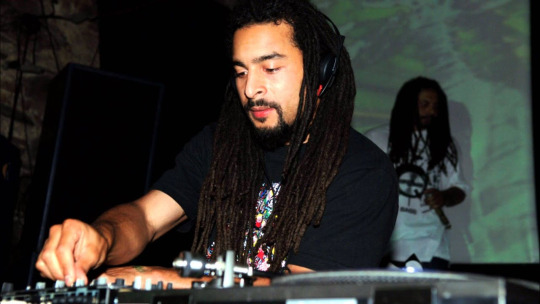
pictured: Mala, one of the godfathers of roots Dubstep
—
To be blunt, “genre” isn’t just about approximating what a song sounds like. If you say “I love pop music”, that honestly doesn’t mean much. The more specific you get, the more you will approach something someone can imagine like “I like experimental progressive noise pop music”. Ok, I can start to imagine things that likely approach what you're talking about, but even then it will usually not help someone fully understand what something truly is. In categorizing and approximating music styles, genres only go so far. So what makes them important then?
Well, not to say that approximating a style when describing an artist to someone is a bad thing or that doing so isn’t meant to be valued, but it’s hardly the only reason these labels exist. Importantly, “genre” helps establish culture, history, and a musical identity. So when you're trying to tell someone you're listening to a "progressive rock” project, you’re not just imagining odd time-signatures and complex riffs, you’re also meant to understand and consider that whatever is being described as to you has some sort of relevance or importance with regards to the history behind progressive rock; the culture of college bands in the UK, the sound that the punk movement revolted against, the progression of musical storytelling in rock music since the late 60’s and early 70’s, stuff like that. There’s a distinct culture and history you can pinpoint and understand when you describe something as being progressive rock and you can’t just go around calling any complex electric guitar oriented music "progressive rock" unless it has those specific ties as well as understanding and iteration of the roots.
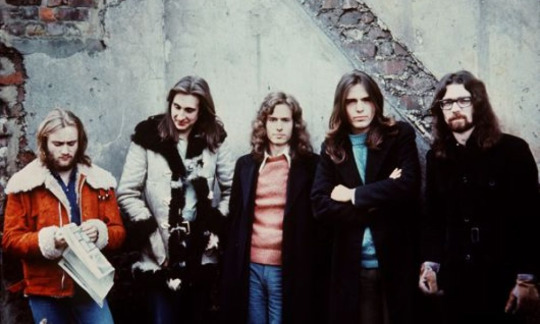
pictured: Genesis, because progressive rock mention
—
Genre labels help to clarify what kind of culture and histories a music project is being associated itself with and where a lot of its inspiration comes from. This is much more compelling reason for underlining the importance of genre labels and why they should be used correctly.
So, there is something I need to get off my chest then. There are a lot of misuses of genre labels all over the place, especially online. And I’m not talking about saying something is “Alternative Rock” when it’s clearly some kind of “Folk Rock” record instead. What I’m talking about is something like “Dubstep”.
Even as recent as a few years ago, I started personally reclaiming the term “Dubstep” as a genre label to describe any bass-adjacent music. At the time I did this, I thought it was cool, because the term Dubstep had been dubbed (pun intended) to be cringeworthy lexicon to some people. And while I feel that’s a noble reason to reclaim something like that, because some weirdos think it's cringe, in this case I actually think it’s wrong.
The term “Brostep” has been used to describe any non-roots bass-oriented music that originates from the proper roots Dubstep. It’s a term I didn’t like FOREVER, especially because the phrase was derived as a generalization of the kind of people who tend to listen to it. However, I actually think that Brostep is a title that people should be more comfortable and confident with labeling things as.
The original Dubstep came as a result of Jamaican immigrants bringing Dub music to the UK, which then fused with the remnants of 2-Step Garage which was prominent in the 90’s just years prior. Timbah.On.Toast made a great video called All My Homies Hate Skrillex and it is a really good breakdown of what separates roots Dubstep from the Americanized Brostep, which came after it. I think everyone knows by now that I have a deep, deep love for EDM based Broste and I am the biggest Skrillex fangirl alive. So being both a Brostep and Skrillex superfan, please understand that I think the video is one of the most important things you can watch as an EDM enjoyer.
Conflating the term Dubstep with things that aren’t actually Dubstep is honestly a slap in the face to all of the pioneers of Dub and Dubstep, which famously were both pretty much ENTIRELY invented by black people. I think it’s fair to say that incorrectly labeling music in this way has racist implications. It dishonours and twists the legacy of the music. You can find og Dubstep to listen to on the RYM Ultimate Box Set > Dubstep page. Check some of that out, then listen to some 2010, 2011 Skrillex and see how different things really went.
It confused me at first when I was a teenager, I didn't understand why so many people hated Skrillex back in the day. I came to realize so much of the hate wasn’t even really with regards music itself, but the total lack of understanding or care for the roots of the genre, which all of his work was founded upon and he then subsequently bastardized without caring at all. It was pure disrespect, it was practically cultural erasure and so many people will now only know of Dubstep as “that Skrillex transformer screech music”. Yeah. It actually fucking sucks.
But there is a LONG history of black music being erased from history and being undermined, whether entirely intentional or due to systemic unawareness.
I saw a post the other day talking about how it sucks that so much music is just lumped into being “video game music” when so much of this stuff has deep roots and cultural significance. The first example pointed how a lot of acid jazz music is just described as “Persona music” by the layperson now. Meanwhile, Acid Jazz as a genre is a huge development on things like roots jazz, disco, funk, and hip hop music. You know. All genres that were invented by black people. Fascinating, right?
Jungle music was also mentioned. And this one is very particular for me. Jungle music, when not being generalized as "PS1 Music", is often just called drum & bass or breakcore (also please Google the difference between breakbeat and breakcore, thanks) which are all fundamentally misunderstanding what Jungle music even is. Much of Jungle music, AS MANY THINGS DO, finds VERY prominent roots in Reggae, Dub, and sound system culture in Jamaica as well as countless other prominently black communities in the UK.
But it doesn’t stop there.
If you’re unfamiliar, there is a genre called “IDM”, otherwise known as Intelligent Dance Music. When I was a kid, and I first heard that word, I immediately was like “that is the most pretentious, stupid thing I’ve ever heard”. Eventually as I grew up, I just stopped thinking about that and started referring to more music as IDM. This style of music is generally characterized with “complexity” and being “not much danceable”. While I don’t think there’s anything wrong with the music that is called IDM, I do think there’s everything wrong with the term IDM, intelligent dance music.
When asked how he feels about being labeled as an IDM artist, Aphex Twin responded:
"I just think it's really funny to have terms like that. It's [basically] saying 'this is intelligent and everything else is STUPID.' It's really nasty to everyone else's music."
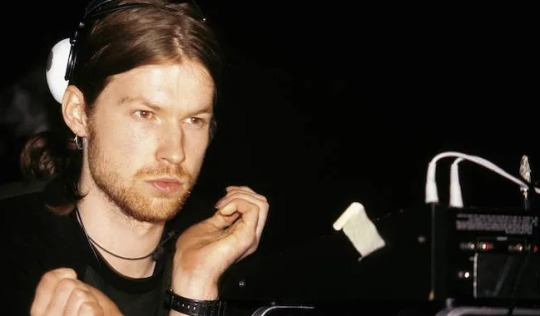
pictured: Aphex Twin, the funnyman himself
—
I think most people would agree with this sentiment. It’s so strange to call one kind of music “intelligent”, out of the hundreds of thousands of genres out there. But let’s bring this back to Jungle music. The reality is that IDM started to become a term around the same time that Jungle music became prominent, in the 90's. Both styles of music are complex, introspective, skittery, and chaotic (but refined and often disciplined) genres. Except, of these two, Jungle music was the one pioneered primarily by black artists. IDM was a sort in competition with Jungle. To therefore call IDM “intelligent” in comparison to Jungle music ... well. I don’t feel like I really have to explain why that’s fucked up.
A lot of people have proposed different names for IDM. A quick look on reddit yields things like “Experimental Electronic” and “Brain Dance” (which was coined by Aphex Twin's label). Me personally, the term “Electro-Prog” comes to mind. Sounds cool.
Similar conversations are presently being had about the term “Riddim”. This brings us back to the dubstep side of this discussion again. Riddim, as an EDM genre, is an offshoot of Brostep music that focuses a lot on repetition over the downbeat, maintaining an insanely distorted sound design, a lot more than the average Brostep song. However, the term “riddim” originates — yet again — from the Jamaican Patois for “rhythm”. And Riddim as a musical style in Jamaica is actually more associated with things like dancehall and reggae, rather than the commercialized "Riddim" that is several hundred times removed from its own roots.
Last year, musician INFEKT proposed that what most EDM listeners call “riddim” should be referred to instead as “Trench” in an article on their website. This proposed name is derived from Getter’s use of the term on his 2014 record “Trenchlords Vol. 1”. I don’t personally know how much I resonate with the term, but whatever the consensus is, I don’t think we should be conflating a westernized, commercialized, and EDM-centric genre like this to Jamaican roots music. Over and over again, it seems that black music is constantly overwritten by developments like this, so I think more care needs to be taken in not allowing that to happen.
As a side note, a lot of people online seem very keen on appropriating Jamaican Patois quite often? There are so many examples of this. When the term “Bomboclaat” started making the rounds on Twitter a few years ago, so many white people were quick to either talk wildly about the term and trend or otherwise start saying it as well. There was a fucking article that sought to answer “The Bomboclaat >> Meme << Meaning Explained”, like they’re not dissecting an element of Jamaican slang lol. Then there was a period of time where people were constantly saying things like “On Jah?” as a stand-in for “On God?” even though this, again, is Jamaican Patois. And even now, you have tons and tons of non-black people going everywhere being like “what is blud waffling about?”, the phrase “blud” ONCE AGAIN also being Jamaican in origin.
I shouldn’t even have to explain what makes these kinds of appropriations weird and messed up. But black people lose jobs and are denied basic things in life over their hair styles, their expressions and slang, and so many other things that a white person can just appropriate and face zero consequences whatsoever for.
That aside, aside. Understanding and labeling genres correctly is such a big part of music history and highlighting and preserving cultures worldwide. When efforts are made to undermine the meaning of a genre label or otherwise use it incorrectly, so much damage is done to the communities and people groups that innovate and pioneer this art to begin with.
For these reasons, I will gladly use the term Brostep. I will happily call things Electro-Prog. And when you talk about genres like Jungle and Dubstep, say it with your whole chest. Be proud of the human race, show respect and love for the people who have forged the greatest parts of music with their bare hands. We will always stand on the shoulders of giants as musicians, so instead of pretending you yourself are the giant, build monuments and maintain the history of these people. You as an artist are nothing without them.
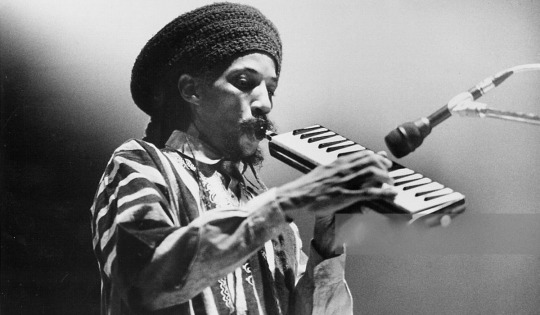
pictured: Augustus Pablo, one of the most important innovators of Dub. Without him, and without many of his contemporaries, I would reckon that half or more of all modern music would simply not exist.
CONTENT WARNING FOR THIS FINAL SECTION, THERE ARE LIKE LOTS OF STRANGE SLURS AND RACIST VIBES.
—
One last thing I wanna mention, this is slightly tangential but I think it's relevant to this conversation. It's always weird how lots of websites categorize things like this:
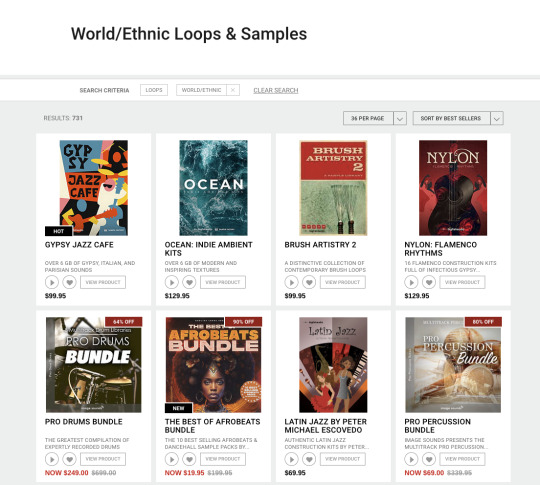
From Big Fish Audio... "G**sy*? "World/Ethnic Loops & Samples"? What the fuck are you talking about. Seems like racism to me.
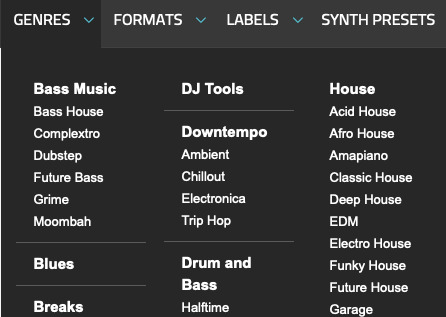

On Loopmasters they have a "World" section. Any Americanized genre gets its own category, but the entire continents of Africa and Asia as well as the country of India and region of the Middle East (which are part of Asia, hope this helps btw) and lastly South America are stuffed into the nebulous "World Label". Seems like racism to me. Are you telling me you weirdos can't figure out a better way to represent these things?

But then Psy Trance gets its whole entire own category? Aren't there only like five people who listen to Psy Trance? /hj . But like come on.

Shoutout to WA Productions for categorizing a universe of suspiciously mostly black music as """Urban"""". And this company is a dime a dozen, hundreds of corpos do this shit.

East fucking West, what is this dude. There is a racism happening, I just know it. Please give me a count of how many poc are on payroll at your company, I am so curious.
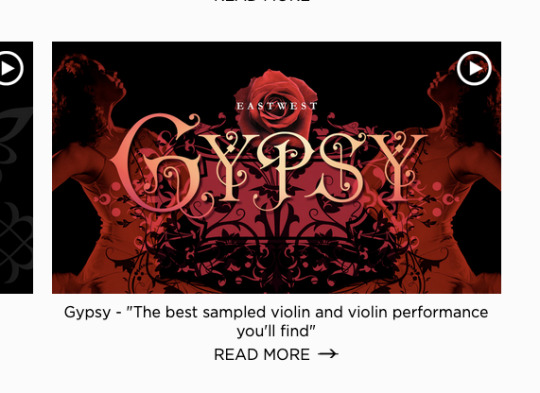
And while we're at it, East West, what is this. Tell me. Fucking tell me.
Thanks for reading.
251 notes
·
View notes
Note
Hey I just wanted to ask you, what do you think of the fact that in ToA the fact that Apollo bullied Harpocrates was basically made up and has no basis in myths? I'm kinda conflicted, because I can get behind holding the deities accountable for the stuff they have done, but that one think was made up.
Hellooo <3
I have seen this as a common complaint about ToA. And yes, I see the view - it has no basis in the actual myths, and therefore shouldn't reflect on what actual mythological Apollo has done.
Buckle up. I've got some thoughts to share here.
There are a couple things to consider here:
The Camp Half-Blood Chronicles are not meant to be 100% accurate to the myths. Nor did Rick really intend to do so when he first created the series - after all, PJO started out as Haley's new bedtime story, and to give him a character he could relate to. That was the main goal of Rick's.
Does Rick do his best to stay true to the myths? I do think so. Sure, he trips up at times (details of the myths [ie, Midas was not the judge of the Apollo V Pan contest], characterizations of the gods [ie, Aphrodite & Ares), ect.) but all in all he does do his best to give us a well-rounded story that has Greek Mythology as its influence.
Because also remember - PJO started out as a story about the demigods, not the gods. If the gods had originally been Rick's focus instead, I think we would have a bit of a different tale.
So a bit of creative liberty can be taken here, especially since Rick basically decided 'all myths are true!' with his Kane Chronicles and Magnus Chase books - it makes sense, from a storytelling perspective, that (ToA) Apollo would have crossed paths with Harpocrates at some point.
With all honesty, the CHB Chronicles shouldn't even be taken as fact about the myths - about the gods. Because no mythological series is ever 100% accurate, and to assume they are is disrespectful to the culture these myths come from.
And continuing with the storytelling perspective...honestly I think it was a pretty interesting choice on Rick's end. It's not myth-accurate, but I think it does add more to the story Rick is telling us.
He's not using these gods to make them look bad, after all. He's using them to tell a story. To give us a message.
And ToA's mainly centers around abuse.
Zeus isn't an abuser in mythology, but Rick made him one in his books to show us how abuse works. How it can be difficult to accept that you have been abused.
How hard it can be to acknowledge the fact that you have caused pain yourself.
Because while it seems like Harpocrates would cause Apollo's whole character to take a bit of a dive (after all, nobody likes a bully, right? Who would!), I...disagree.
I think Harpocrates deepens Apollo's character.
Stick with me.
I have been bullied in school. Fourth grade and seventh grade in particular were Dreadful for me and in seventh grade I would come home in tears about 95% of the time. I would even skip track practice because I was so emotionally unbalanced from the day I just couldn't take another minute.
There was something that my parents, grandparents, the parish deacon, ect all told me. There is probably a reason why bullies picked on me;
They were jealous.
There was something wrong with them; or, connecting to this point;
They were hurting.
They were hurting.
Anybody else's brains go "Bingo!"?
Because think about it. By the time Harpocrates comes around, Apollo's already spent a lot of time under Zeus's thumb - under his abuse.
And personally, I don't think Zeus likes the other pantheons. And I bet he really doesn't like it when pantheons...mix.
Which is something Harpocrates is. A mix between his original Egyptian self, and what Ptolemy made him to be.
So imagine this: You are Apollo. You have been dealing with your father's abuse for centuries. You are hurting - physically, emotionally, and mentally. You come across this god who's a mix between Egypt and Greece. He is the opposite of you - silence where you are sound.
Wouldn't he be the perfect target to lash out at, without repercussions? After all...I doubt Zeus would care if Apollo was kicking around a mixed deity. Perhaps...he would even encourage it...
But I hear you - "But Apollo barely remembers Harpocrates!" And yes, he does barely remember him and it takes him a bit to acknowledge the fact that he did bully him.
So here's the kicker; I think Apollo lashed out at Harpocrates only a few times. He tried to transfer the pain he felt onto another, on the hope it would make him feel better.
But it didn't. Nothing made him feel better about himself.
And what's something we know about Apollo?
It's how much guilt he keeps bottled up. And I bet that after a few times, Apollo just...stopped going after Harpocrates. I think Apollo started feeling guilty about it, but quickly stamped it down and tried to forget about such feelings by forgetting about Harpocrates.
What you don't know can't hurt you, after all, right?
#the oracle speaks#HERE I GO ANALYSING AGAIN WHOOP#apollo#toa harpocrates#pjo apollo#toa apollo#the trials of apollo#trials of apollo#the tyrant's tomb
79 notes
·
View notes
Text
Some thoughts on the Stray God worldbuilding
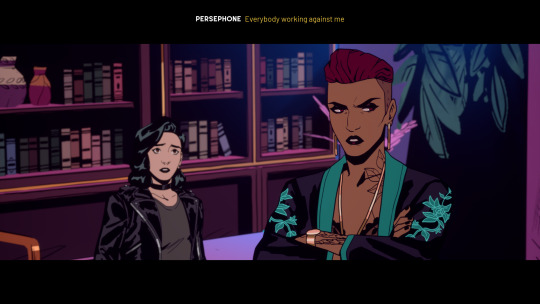
Okay, I really, really need to talk about this. Because... look, folks, I usually do have a ton of problems with the entire "Let's make a Greek Mythology fantasy". Mostly because a lot of it downplays the shittyness of the Greek pantheon - and this entire iffy thing of folks giving all this gravitas to Greek and Roman culture... There is a reason we usually know stuff about that and not less about the Egyptian and Mesopotamian mythology. Doesn't mean I loathe all the stuff that includes the mythology (still absolutely adore Hades), but... my first reaction to some western media property including the Greek gods is usually to roll my eyes.
But let me talk about why I actually really liked Stray Gods in this regards.
Spoilers for the game!
The first thing that really stands out to me is, that they actually gave the gods a reason to be in America! In basically any Urban Fantasy setting I have seen so far that includes the Greek pantheon in America (and there are a few of those) there either is no explanation for those very European Gods hanging around in the US - or the explanation is along the same lines of Percy Jackson with "Oh, yeah, center of western culture has wandered to the US, so we are hanging around here now." The first - no explanation - one is fucking lazy. The second is just so... American self-importance.
So it was so nice to see that a) we got a reason in this game and b) the reason was not American exceptionalism. Like, the entire story with the gods being refugees from WWII? Fuck yeah, that is what I am talking about. That is the kinda storytelling I am here for. Not only does it give it a proper reason, but it also just gives the entire thing some juicy drama and... tragedy. Like, OMG, the entire Aphrodite story had me in tears.
But there is also the fact that this story does not idealize the gods at all. They are broken people. All of them. Trying to live out a glorious past that was not so glorious to begin with. The game tots got bonus points from me for making it clear, that Zeus was a fucking asshole all along. And also making Persephone the victim of Hades instead of making their story all cutsy like almost all interpretation these days do.
I also just generally appreciated the choice of the gods in this. Rather than going with either of the big three around, they really played up the female gods in this and that... I appreciate a lot. :D
So, yeah. The game really did good in this regard. I love it. Now... let me go back to fawning over Persephone. xD
206 notes
·
View notes
Text
Women in Jujutsu Kaisen
Let’s get this out of the way first: if you’re reading this because you enjoy reading posts by people who hate Jujutsu Kaisen, you’re going to be disappointed. I actually like Jujutsu Kaisen a lot, I have a lot of positive things to say about it, and I’m going to be explaining my reasoning here. You should probably move on if you want trash talk. But if you have a negative view point that you’re nevertheless willing to reevaluate or recontextualize by looking at things from a new perspective, please read on.
A lot has been said about how women are written in Jujutsu Kaisen. A lot of good, and a lot of bad. I think a lot of the bad comes from how Jujutsu Kaisen was praised so early on for how it’s women were written, only for people to either not see it or have their expectations not be met due to events in Shibuya and the Culling Games. However, while I try to respect diversity of opinion, I feel like a lot of people aren’t really grasping why the way GeGe Akutami writes women was lauded. I think a people have lots of different ideas of what makes for a well-written female character, and don’t find what they’re looking for in Jujutsu Kaisen, thus they get angry and they post online about how GeGe Akutamisogyny isn’t going to beat “the allegations.”
I’ve never liked the justifications put forth for that argument. There’s a lot of subtext to how the female cast of Jujutsu Kaisen are written that can’t fit neatly into the simple world of page and panel counts or win-loss ratios. And, fortunately, there are tools for feminist literary analysis that I am going to employ in what will hopefully be a short trilogy of posts, starting here.
When I see people criticizing how women are written in Jujutsu Kaisen, I usually only see them using one point of interest: the outcome of a fight. If a female character doesn’t win a fight, then some people in the audience take that to mean that GeGe Akutami hates that character, hates women, and doesn’t want them to succeed — or some variation of that, perhaps less extreme.
This is a product of Jujutsu Kaisen being a Shonen, and thus being on the radar of Shonen fans who — let’s be honest — are not known widely for consuming anime or manga outside of the Shonen demographic. Shonen is heavily focused on conflict and competition as storytelling, it’s why the term “battle shonen” is used so prevalently. And Jujutsu Kaisen doesn’t try to deny its own Shonen heritage: it uses fights for storytelling all the time, sometimes even more than other Shonen seem to do.
I think this might also be a cultural thing. Anime and manga are written very differently from Western movies or comic books, with very different cultural background and different artistic sensibilities. However, that’s a topic that I’ll unpack another time, maybe not even in Part 2 or 3 of this post.
Point is, we need to step back and get some perspective. People who use the losses or deaths among the female cast as evidence that GeGe hates women, or sees women as inferior, or has some sort of passive, culturally-inherited sexism in their worldview are suffering from tunnel vision. You need to look at the story as a whole sometimes, not just the one subject in question.
Go back to the Goodwill Event, and the fight between Nobara and Momo. Their whole conversation is a huge part of why Jujutsu Kaisen was praised early on for how Akutami writes women, and I think the subtext of it really went over some people’s heads. It did mine, the first time around: to me, it just felt like a competent, if tired “girl power” moment for Nobara. But as I invested more time and thought into reading the series, and as I learned more since first viewing that scene, I started to realize what I wasn’t seeing in that scene.
Momo shares something in common with all of the Kyoto Students, Todo and Miwa being the exception. In addition to seemingly coming from a more-or-less established sorcerer pedigree, Momo shares the general pessimism that hangs over the Kyoto Students like a dark cloud. There’s this very morosely Japanese sense of “woe is me, but there’s nothing to be done” about Momo, Mai, Noritoshi, and Mechamaru, in one sense or another. These four are people who will complain about a problem, then just sit while it washes over them and batters them like a wave. They just accept the unfair hand they’re dealt in life, and while they don’t like it, they treat it as something no one can overcome. Furthermore, on some level, I think these four don’t necessarily want to overcome the misfortunes and injustices they face.
See, Momo pours her heart out at length about how hard it is being a woman and being a sorcerer. And the way she talks about it is a very different critique of society than you’d see in a lot of Shonen. She talks about how women are expected to be perfect: beautiful, graceful, exquisite, the model of femininity, while also keeping up with the macho “might makes right” sensibilities that dominate sorcery. In her words, “men have to be strong, women have to be perfect.”
This isn’t something that’s just being plucked out of thin air, this is a criticism of the girlboss culture that arose through the 2000s and 2010s up to now. Women are expected to battle sexism alone, in their own lives, by being exceptional: rather than reforming cultural structures that put women at a disadvantage to men, girlboss culture says women just need to always wear perfect makeup, always be fashionable, always work 2.5 times harder than men, and find time to raise children and have a side-hustle at the same time. Instead of fixing the problem, it’s telling women, “Just work harder. Just be better.” As if women haven’t been having to work harder for nothing in return for the past 50 years, holding down jobs that they have to go above and beyond to prove themselves in as compared to male coworkers for whom the job might as well be a guarantee by comparison, having a ceiling put on their promotion while men who didn’t put in as much work get to move up the company ladder, and frequently having to juggle having a child and taking care of housework in addition to the expectations of jobs that often don’t afford maternity leave. And then, on top of all of that, the expectation is then foisted on to have the time and energy to perfectly craft your hair, makeup, and outfit for the day, and if you miss a single step of the whole stupid dance, you’re seen as an underachiever. That’s girlboss culture, and that’s what Momo is indirectly criticizing when she laments the contradictory and unfair expectations women in the sorcery world have to uphold. They need to fight just as hard as the men, while wearing skirts and not getting a single scar on that pretty face.
(Just as an aside, I love the way this conversation comes about. Momo and Mai are pretty close to each other, to the point that it sometimes feels like nobody else in the Kyoto school likes or respects Mai like Momo does. And Momo targets Nobara with this whole speech because of the friction between Mai and Nobara, and because she wants to stand up for Mai. I like that element of both solidarity and conflict between women, about being a woman, and I’ve always gotten sapphic vibes from Momo and Mai, so I’m glad that she’s the one giving this whole speech and why she’s doing it. But I digress.)
And the thing is, she’s not wrong. Neither Nobara nor the story as an overall entity refutes anything she says. However, Nobara points out something else about Momo that she shares in common with the other Kyoto Students who were raised to be sorcerers: the way she treats her whole life like a job. Momo has internalized the culture she despises, and instead of trying to rebel, she just accepts all of it as “the way the world works.” She soldiers on, just as Noritoshi soldiers on with his family’s expectations, Mai soldiers on with her pain and feeling of being abanoned, and Mechamaru soldiers on with the isolation, unfairness, and general misery that comes with his Heavenly Pact. Soldiering on, as if soldiering on has inherent value when it leads nowhere and accomplishes nothing. Never addressing the problem, or trying to find a way around it; simply rolling that boulder up the hill, grumbling all the way. She and the other Kyoto Students have this sense of treating their own misfortune as a badge of honor. To them, they’re justified and validated because they have experienced more than their fair share of suffering. They’re always eager to flaunt the crosses they have to bear.
Momo treats being a woman as a curse. Funny how that ties into the rest of the narrative, huh?
For Nobara, being a woman is not some great burden she has to live with. Being a woman in general and being Nobara Kugisaki in particular is something she revels in, and it’s just the fault of everyone else if they think otherwise.
Let’s talk about Nobara, and let’s not reduce her to her death scene. When we meet Nobara, she’s immersing herself in the Tokyo way of life after moving from the countryside to the big city. She encounters a sleazy talent agency recruiter who’s pestering women on the street with his hand-rubbing, obviously nefarious ways… only for Nobara to stop him, turn him around, and say, “What about me?” He gets intimidated, tries to run, and she drags him back. From her perspective, he should be happy to have her, and the fact he isn’t means he’s ignorant of her beauty and wit and needs to be corrected. If he won’t convert to Kugisakism, then her charms are wasted on him, and he’s doomed to the dim world that is Nobaralessness. When she meets Yuji and Megumi, she introduces herself with a line that’s translated into English as, “I’m the only woman in your group.” But from what I’ve been able to gather, her line in Japanese is, “I’m the red mark.” The phrase “red mark” can mean “the one who’s different from the others” — like the one girl in a group of boys — or it can mean “the one who stands out.” So you can also read it as her saying, “I’m the stand-out of the group.” Nobara Kugisaki, everybody.
If you want to talk about how literary circles analyze how women are writing, let’s leave the topics of fight outcomes and feats to one side. One thing you immediately look for is motivation. What’s motivating a character? This is important for how female characters are written, and especially in Shonen, which revolves so much around characters with some goal or belief that the story pursues through fights and other forms of adversity.
Now poorly-written women will tend to be motivated by men. They’ll be attracted to a man, or trying to support or protect a man, or trying to find a man. This by itself isn’t a death sentence for a woman’s characterization, but it is a red flag. It’s also not as if women have to never interact with or think about men to be well-written. It’s not an on-off switch, a bad writing-good writing switch. It’s a meter, like Mahoraga steadily adapting to a technique. Just a little bit is fine, and can be even turned into good writing in capable hands. But if it becomes too prevalent and is never examined, then you get a situation where a story’s women are not permitted lives outside of being in a male character’s orbit.
How do we gauge this? Well, there are lots of ways, but one of the more well-known and simple techniques is the Bechdel test. The name is derived from Alison Bechdel, feminist author who penned such classics as Dykes to Watch Out For. Bechdel proposed a simple litmus test for how to tell an author’s seriousness about writing women, and it goes like this:
1.) Look for scenes where women talk to each other.
2.) In those scenes, check for how often they’re talking about things besides male characters.
This isn’t the only way to tell if women are written well or not, and some will say it isn’t even the best way, but it’s a good foot in the door to get us thinking about what divides well-written female characters from poorly-written female characters. I’m not going to go back and scan through the whole manga just yet, but let’s look at some examples.
— The aforementioned conversation between Nobara and Momo, where the two pit their different view of what it means to be a woman and a sorcerer against one another.
— Maki and Nobara talking to each other after the encounter with Mai and Todo. Curious by meeting Maki’s sister, Nobara talks to Maki a bit about their upbringing. Having gained more insights into Maki’s past and personality, Nobara leans on her and tells her how much she respects her.
— Miwa and Mai discussing the upcoming Goodwill Event in a flashback. Mai tells Miwa that Maki is weak, which leaves Miwa unprepared for their fight.
— Maki and Mai arguing and coming to terms with what drove them apart. Mai just wanted a peaceful life with Maki, but Maki couldn’t be happy and authentic with herself if she just left things the way they were. She was forced to choose between herself and Mai, and Maki chose herself, knowing that Mai would suffer and that she’d shoulder some of the guilt for that.
This indicates that GeGe found it important to divorce the identities of the female characters from male characters. And this holds true in what drives and motivates the female cast.
Nobara is motivated by her own goals. She hates the countryside, and she loves the city; becoming a sorcerer is a way she can make a lot of money, live in the city, and pursue the kind of lifestyle she values. She wants to be a true blue Tokyoite, wearing trendy clothes and eating crepes and taking selfies by the statue of Hachiko outside Shibuya Station. She’s not doing this to avenge her dead brother, she’s not doing this to find her father, she’s not searching for a strong man to sire strong children — yuck. Nobara has aesthetic values and strongly held beliefs, and becoming a sorcerer lets her pursue those values and beliefs.
And if you really want to analyze the action side of Jujutsu Kaisen as an indicator for how GeGe feels about female characters, consider how Nobara takes to sorcery like a fish to water. Both Megumi and Yuji have their own internal dilemmas with being a sorcerer, but not Nobara. In a series where mindset is so important, Nobara has the mindset. Uro describes the model sorcerer as having “no concern for others and an overwhelming sense of self.” There is no one with a more overwhelming sense of self than Nobara. She’s loud, opinionated, loves to argue, flaunts herself, and demands other people give her more than what they think she’s due. She’s narcissistic, but that faith in herself makes her mentally strong.
She lacks experience, but even then, she learns and grows rapidly through the series. Due to running out of nails to fend off cursed spirits during the first stretch of Fearsome Womb chapters, she invents Hairpin as a way to reuse nails she’s already launched and embedded in a surface. She manages to land a Black Flash during the tag team fight with Yuji, and it’s her oppressive use of Resonance on Eso and Kechizu that turns the tides — a tactic which required her to hammer nails into her own arm. She takes it on the chin and gets her brain rattled around in her skull during the fight with Haruta, but even while borderline unconscious and suffering from a concussion, she forces herself to keep him talking in hopes Nitta can escape and manages to get to her feet and keep fighting despite the total disorientation and inability to summon her strength. While she didn’t win the fight, she showed more fighting spirit than half of the male cast tends to, and I find it kind of gross that people will ignore all of that and mock someone who kept fighting against the odds. That’s like laughing at Mumen Rider when he’s hopelessly trying to fight Sea King even as his body is breaking. I don’t exactly see what about either case is so funny or worthy of ridicule.
Even in the showdown with Mahito, people always fixate on how she dies, but never consider what led to it. She crosses paths with Mahito, and even knowing from Yuji what he’s capable of, she goes in — partially because he hurt Yuji, her friend, and she wants to make him suffer for it. And her technique turns out to be a worst case scenario for Mahito. She’s hammering his clone with Resonance and sending the blowback to the original while he’s fighting Yuji, dividing his attention and weakening him. Her only mistake was chasing him down, and even then, this isn’t the story punishing her. It’s the story being consistent with who Nobara is. She’s got a dangerous enemy on the ropes, her pride is bruised after the fight with Haruta, and she has a chance to get vengeance on someone who’s hurt her friend while helping said friend in the process. If she hadn’t followed Mahito into the subway, then she wouldn’t be Nobara Kugisaki.
And in her final moments, Nobara achieves something that’s considered to be out of reach of most sorcerers. She dies content, with a smile on her face. Nobara may not have realized her potential to be a great sorcerer, but she got what she, personally, wanted. Sorcery was a means to an end, and she got to live the Tokyo life and meet interesting people that she considers her friends. She got to fill out that finite number of seats in her life, and even meet a few people who pulled up a chair when she didn’t expect it. In her words, “It wasn’t so bad.” Nobody else but Toji and Gojo have gotten to die this satisfied — Toji because Megumi had grown up free of the Zen’in curse, Gojo because he was authentic to himself right to the end and left it all on the field. Nobara was authentic to herself right to the end, and that’s worthy of high praise. If she is definitely dead and not coming back, then she managed to accomplish what it was she wanted before dying. Not many get that luxury in Jujutsu Kaisen. It hurts because I liked her and admired her and appreciate the way she was written, and her dying doesn’t make the value of her character disappear from the story entirely. It’s the character’s death, it’s everything that led to that death and what that death means to them and to those who are left behind. And if it’s manga that explore death, nobody does it better than GeGe Akutami.
Lots of people will point to an interview where GeGe said that Nobara was not originally considered part of the cast, and they’ll use that as evidence that secretly, GeGe’s a big stupid misogynist who hates women and likes killing them in stories and blah blah blah blah blah. You know, first of all, I doubt that the editor held a gun to GeGe’s head and said “Put in a female main character or die.” Secondly, if GeGe really didn’t care, Nobara would just be a two-dimensional copy of Sakura who dies in the first arc or two. GeGe would not have put in the effort to set her apart from other female leads, or given her so many stand-out moments, or given her such an interesting motivation and world view. In short, if GeGe didn’t want to write a female character, they’d do what Kishimoto did: write Sakura. But that comparison is a can of worms I’ll need to pry open another time.
To sum up for the time being, no, GeGe Akutami does not hate women. Losing a fight does not make a female character worthless, and does not indicate a disdain for them on the part of the author. I don’t know about you, but I don’t read Shonen just to see who punches harder. I want to see characters be challenged, sometimes fail, learn, grow, and overcome adversity — and it wouldn’t be adversity if all the characters I like win and survive easily. I love Kashimo and will continue to love Kashimo, and Kashimo being super ultra dead doesn’t change that.
Look out for Part 2, in which I’m going to unpack some really contentious stuff when it comes to challenges and female characters in Jujutsu Kaisen. We’re gonna talk about the concept of screen time, we’re gonna talk about subtext, we’re gonna talk about great expectations and the great unexpected in Jujutsu Kaisen, and we’re gonna talk more in-depth about the narrative outside the narrative of Jujutsu Kaisen in a vacuum. If your sense for danger is giving you a bad feeling about this, then it should be: we’re talking about that. Switch on your Anti-Gravity System, it’s going to get messy.
#jujutsu kaisen#literary analysis#analysis#jjk analysis#feminism#feminist literature#feminist literary analysis#nobara kugisaki#maki zenin#akutami gege
101 notes
·
View notes
Text
so me and my friends decided to watch all of skibidi toilet together last night and i've been having way too many thoughts
first of all it's unironically pretty good? great animation, and the guy who made it clearly has a very solid sense of pacing, escalation, and visual storytelling. it's also made all the more delightful by the fact that it's just one guy fucking around in sfm - just a great example of something that never stops being deeply stupid even when it evolves into a more serious story. corporate entertainment could never hope to replicate this energy with the same level of sincerity and pure shitpost vibes
i've also been reading some of the journalism trying to make sense of the series and i think it's funny how many are claiming that it's a pure gen alpha thing when it's so clearly born out of early gen z internet culture. there is nothing surprising to me about skibidi toilet except its quality and virality. "sfm series that starts as bizarre shitpost and then grows into something with serious plot" is absolutely nothing new, and it's kinda wild that this has now broken into the mainstream. i think a lot of the people reporting on skibidi toilet just do not really know how to talk about it you know?
lastly, it's really interesting to see how skibidi toilet uses diegesis. it's that "the telling of the story is diegetic to the story" and "the fact that this thing is being recorded has consequences for the narrative" type of storytelling that you see in stuff like r/nosleep stories or web fiction such as marble hornets. sometime i'd love to dive into why this sort of storytelling is so common in internet fiction because i think it's fascinating
67 notes
·
View notes
Note
Ok so I’m rotating ideas about elves and mythology and decided to drop some ramblings in your ask box because of all the wonderful theatre-related thoughts you’ve been sharing!! The thing is that the silm is a mythology right. Like it’s written in that style, and the heroes of LoTR and the later Ages in general are always explicitly looking back to the stories of the First Age (see: Aragorn wanting to cosplay Beren and Lúthien with Arwen). But what were the myths, the cultural stories, of the Elves of the First Age? In Tirion what were the stories that Maglor might write a play retelling or subverting, that Elemmírë might make a new song about, that Míriel might have woven into a tapestry? All cultures have ancient myths – but these characters are a) living at the very dawn of the world, and b) are all going to become mythological figures themselves! It makes me a bit insane. My thoughts are that they told a lot of stories about the war the Valar made on Melkor, and also about Cuivienen and the awakening of the elves, but honestly I don’t KNOW. What do you think? (No pressure to answer this is very random I realise) ❤️❤️
NO I love these thoughts!!! My thoughts generally go along the same vein as yours in terms of the general themes of elven myths. Here are some possibilities I imagine:
Whichever continent the elves in question are not seeing is often the center of the stories. The Sindar and Avari in middle-earth myth-make a lot about the lands in the west; the Eldar in Valinor myth-make about middle-earth. Since we're talking about Elemmírë, Míriel, and Maglor I'll stick to the latter.
I imagine there's aways the pervasive idea of secret Ainur no one has discovered yet. No matter how many times the Valar go "no we promise we're all here in Valinor, there's no other Valar left" there's 100% an elf somewhere going "have you heard about the Vala of bogs? yeah they live in middle earth and they're in charge of all the bogs there and if you aren't careful you'll be stuck serving in their bog court"
Not to mention elves who know Aulë and have heard that his people sleep under the earth, waiting for their time to awake. I'm sure for some elves tell it as simply that, but over time another pervasive myth develops -- stories of great dwarven kingdoms under the earth, kingdoms they're barred from seeing, stories of seven great dwarven kings, each much like Aule in face, each possessing a specific sort of magic.
Imin, Tata, Enel, etc! Not only do we canonically get them as a counting story, I imagine their fates are also something that ends up being talked about? They do not seem like they ever ended up in Valinor -- what happened to them? I feel like elven stories can tend to go along the lines of "and then he turned into a tree" or "he still dwells by the sea where he was born" or "he fell into the cracks of the mountains during the war and became one with the earth."
Myth as a way to explore cultural taboos! Elves coming to Valinor, a land with no pain or crime, with the shadows of war and suffering behind them -- I imagine they must explore taboo and pain through storytelling. What happens to an elf that leaves his wife for another? What happens to an elf who poisons her sister? I imagine there's some gruesome/creepy stories that come out there, but are told with a naïveté to the actual truth of what violence looks like. Something along the lines of "and then the servants of Melkor hacked the elven king into bits, so his wife had to go looking for each piece of him in every corner of the world and sew them back together"
The sea!! Must I say more. The elves emerged from the sea, and they long for it -- yet they cannot go too far into the waves without drowning, and they do not know what lurks under the waves. I imagine myths centering around sea-creatures, around the souls of the drowned, around elves (mer-elves?) who never left the sea and make their kingdoms underneath the waters, etc.
Just some ideas!! If anyone else wants to contribute headcanons for early elf myths to his post, please do!
#lena speaks#theghostinthemargins#thank you for this ask this is something i think about a lot#one of my fave things to think about :)
203 notes
·
View notes
Text
The language of that fall from grace won’t get us home*
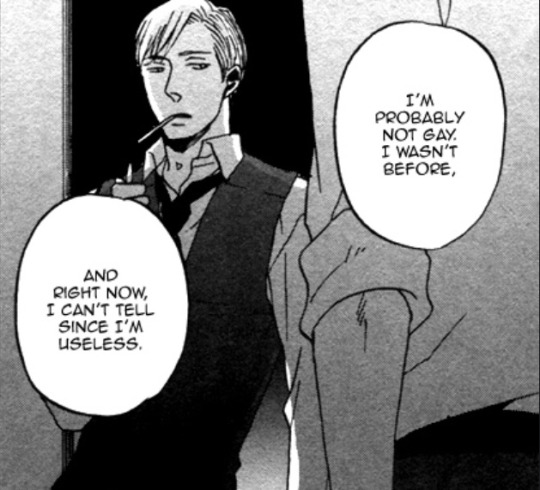
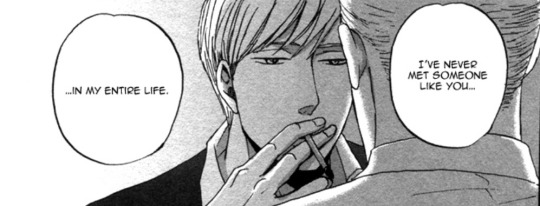
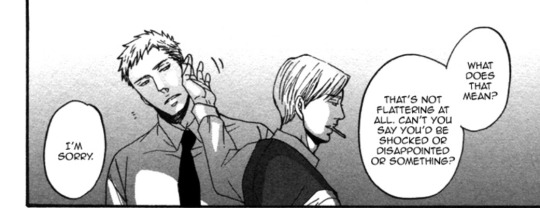
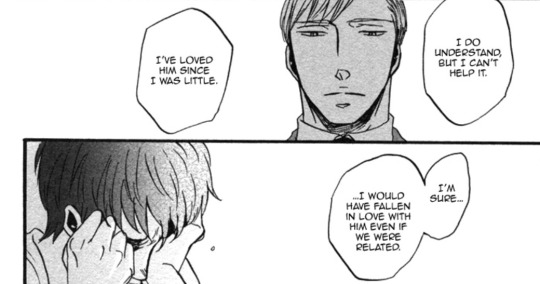
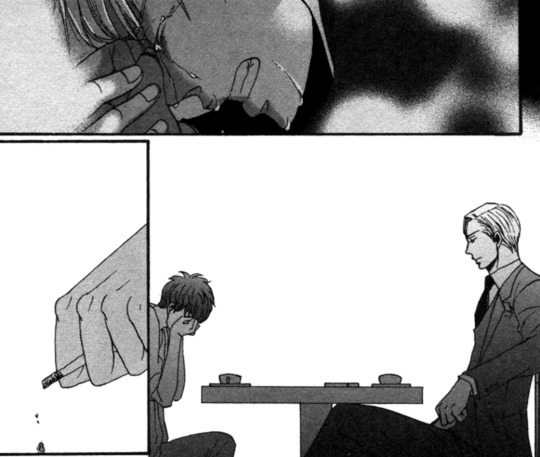
I really love manga as a visual language and its various possibilities of storytelling. Among the vocabulary that can be oh so cleverly used, there is the juxtaposition of images or scenes to show similarities or contrast between concepts in the arc of a single chapter.
In chapter 2 Yashiro and Doumeki have the first serious talk between them. This time deflection is out of the question and Doumeki has to give up his background and family history, since his sister Aoi has been loitering outside of the office. Yashiro is surprised to learn that Doumeki was in the police and, even if he lost his job and served a prison sentence, his motives and actions were far from the common acts of violence committed by petty criminals who become yakuza. “There is one thing I want to ask you though. How did a former police officer end up in a place like this? Why didn’t you leave when you were told to work for me?” Yashiro asks. And the answer probably doesn’t make a lot of sense to Yashiro. Because Doumeki saw him and thought he was beautiful and a beautiful person in the yakuza meant that maybe it wouldn’t be so bad to get involved?
Without beating around the bush, Yashiro asks directly if Doumeki is gay. Maybe he discovered it in prison? So here there are probably some nuances that need a little bit of attention and some flexibility. I don’t really know who is going to read my analysis but surely enjoying this manga are people from different backgrounds and cultural contexts. Are you gay? Is this character gay? What definitions are we using? Let’s be clear then first, this is just an attempt to analyze what Yashiro and Doumeki talk about, not general statements or definitions. So let’s stay in the text, with these characters and their particular experiences and thoughts and hang-ups and their critical vocabulary. After all shouldn’t understanding come before agreement or disagreement? So let’s suspend our beliefs for a moment while reading the chapter.
“Are you a homo? Did you learn the pleasures of anal while you were in prison?”
“I don’t think I’m homosexual. I never was. But since I can’t get it up right now, I can’t say for sure”.
First of all, for these men to define their sexuality the body seems like the place to look, physical responses are less vague than just thinking someone is attractive. Finding anal sex pleasurable or getting an erection, being able to perform, as in maintaining an erection, and reaching an orgasm, these are observable facts, these are things very basic and easy to understand. And even when this is putting it simply, the reasoning around defining sexual orientation for men comes back to the physical reality often in the common language, in the crass language and in practice. Having become impotent and never having experienced anal sex from the receiving end, from the body’s standpoint Doumeki can’t know more than two things: he wasn’t gay before, we will learn more later about his experiences with women, but he knows that he rejected sexual advances in prison or didn’t feel anything about the guy who gave him a blowjob, while with Yashiro something is different. Yashiro inquires further, after all a young man having an infatuation with an older man can be quite common, but often it’s just admiration and the desire for mentorship, guidance and recognition, rather then being something sexual in nature. If Doumeki can’t be sure because he doesn’t get hard, then maybe he can admit that he felt some form of repulsion towards Yashiro when he gave him a blowjob or when he had gay sex in front of him. I think this is the direction of the dialogue until Doumeki says something unexpected: “I’m not sure. I’ve never met anyone like you in my entire life so…”. Suddenly Yashiro is the one who deflects from the conversation, although he can’t help a gesture of affection for this man who doesn’t express disgust towards his behavior.
Little digression here, but following the logic of physical response and physical pleasure only, Yashiro saying that he is bisexual makes a lot of sense since he feels arousal and gets hard with women too, although he prefers the pleasure he gets from being on the receiving end with men. Matters of consent don’t seem to count in this reasoning, although Yashiro gets angry when Doumeki cosplaying as a cop says that if someone doesn’t object or is into it then that can’t be considered rape, at the beginning of chapter 4. I believe there is something inside Yashiro that knows how wrong that idea actually is, that sometimes you are unable to voice your dissent out loud or your body doesn’t fight it but instinctively retreats into what it learned from experience and worked before, even fabricating pleasure from pain. And that maybe physical responses aren’t reliable enough to make sense of our feelings.
But there is another experience that Yashiro knows, and that is that his feelings for Kageyama are independent from what little physical touch passed between them, he knows and can say out loud that he fell in love with a man. That is confirmation enough that Yashiro is queer, something outside of the logic of physical pleasure, something that Yashiro still doesn’t find easier to accept than his sexual preferences and desires. On the contrary, Doumeki as he is at the moment, can only rely on his feelings, since his body is dormant, and those feelings become impossible to ignore or discard because they are calling him and awakening him, giving him hope and direction when he had felt like he had lost everything.
So why did I start this analysis announcing a juxtaposition?
The rain keeps falling as we transition into another day when Aoi is back, this time under her own umbrella. Yashiro manages to get her in a caffè to talk alone, without Doumeki knowing, and even tells her about his own experience, because having someone else who knows what that’s like is more than just a generic expression of sympathy. Yashiro can’t help but be self deprecating and stating how different he actually is from her - we will learn how he convinced himself that rape is harder on women or that he somehow doesn’t deserve to be treated with any sort of care. But Aoi, although she is surprised, doesn’t judge him harder than she judges herself as well, for putting Doumeki and her family in an awful situation. Not a lot a pages, not a lot of words, but there are so many things being said or implied, so much complexity and an instant connection.
When she confesses her feelings for her brother and she shows how confused and conflicted she is and she cries because her love was not only unrequited but also unnatural, since she is sure she would have loved him even if there was a blood relation, Yashiro recognizes the same type of pain he felt when he recognized his feelings for Kageyama. Stripped down to his own honest responses and after all his stepfather did to him, he still couldn’t help but love a man and one who rejected him. Love came to both Yashiro and Aoi regardless their impossible circumstances and felt wrong and painful and unacceptable to the ones they directed their feelings to. For a moment, we don’t know how long, Yashiro can only watch Aoi cry silently, while his cigarette turns into ashes. And looking out at the window, at the light coming through after the rain, he makes a decision, he won’t fire Doumeki unless he asks to leave himself.
Notice how these types of decisions come and how things can change, how these characters are following their hopes or intuition until the next moment they are confronted with another decision to make, another circumstance, and how the storytelling is based on the characters’ little weaknesses and on serendipity, so much so that if we don’t pay enough attention we can miss these delicate threads. This is Yoneda-Sensei’s storytelling.
And the composition of the chapter works around these images and these three people trying to make sense of falling in love in ways that defy common beliefs or expectations, ever their own. How they are getting caught in a love that feels distinct and not subject to some type of physical response or banal logic or law or rationale. How useless is fighting against it sometimes, or how love can feel like pain and feel like hope at the same time.
*frase is from a review written by Kevin Brazil about a book called An Apartment on Uranus by Paul B. Preciado and published in ArtReview on March 1st, 2020.
#saezuru tori wa habatakanai#saezuru analysis#yoneda kou#manga analysis#eri reads saezuru#trying to convey my thoughts and impressions but feeling like I didn’t particularly succeed
23 notes
·
View notes
Text
Champion Geeta, The Pokémon League, & The Hidden Story Of Pokémon Violet’s Turo - Another Analysis
So this is just a small analysis to tide you over before my biggest two posts planned (Analysis of Arven and Turo as characters) drop, and while I am terribly sorry for the long title and the multiple parts, it’s warranted, I promise!
You see, while going through ScarVi, I noticed some very interesting background storytelling and symbolism that I thought would be interesting to bring up in a post in case others didn’t catch it. I also think it would be super cool if any future DLC expanded upon these concepts, because they tell us a fair bit about the League, Geeta, and Turo! Of course, a lot of this should be taken with a grain of salt as it is based on inference, but I still felt it was important/interesting enough to share. As usual, this post will contain giant spoilers for the plot under the read-more.
I adore any feedback / opinions on what I post, and everyone’s comments on my last post were so sweet they made my day. So if you have any theories or things to point out that I may have missed, please do bring them up! I love reading them! :D
Without further rambling, here ya go.
The League and Champion Geeta know a lot more than what they say throughout the game, and it’s entirely possible that both the Academy and the Pokémon League were financing Professor Turo’s dangerous research in the Crater for a time, but then stopped.
We know already that the first successful foray into the Great Crater a few centuries ago was funded by the Uva Academy, as can be viewed in the picture below which can be found within the Violet Book.
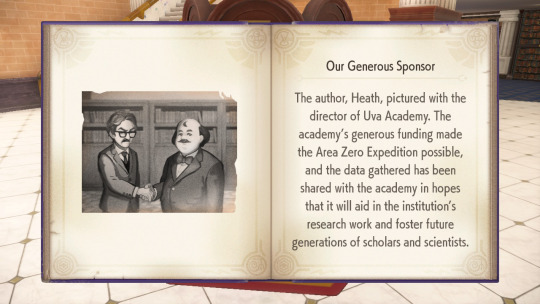
However, who was financing Professor Turo’s Research? When exploring the Research Bases, we’re introduced to many journal entries written by Turo, all which shed some light on the main plot, but also help to hint at several things that have happened in the background.

First of all, we know that he was being funded by a corporation of some sort. We can also infer that this funding was given with the expectation of receiving the fruits of that research (we will revisit this and why it is important later).
So what corporation funded this exploration of the unknown? Well, you see, there’s a littering of symbolism across Paldea, and a lot of it revolves around two concepts: Treasure, and Travel. More accurately, how to find treasure through exploration. Maybe looking at some of that can help us.
Let’s start with the research stations themselves. Each one has a large logo branded upon it, fairly difficult to miss. This logo depicts the silhouette of the Great Crater, and the latitude and longitude lines of a map. This makes sense, as for centuries, the Crater has been a culturally significant mystery and the driving force behind many expeditions which had intentions of documenting it. That, and maps are often associated with treasure, something which the Crater was fabled to hold within it.
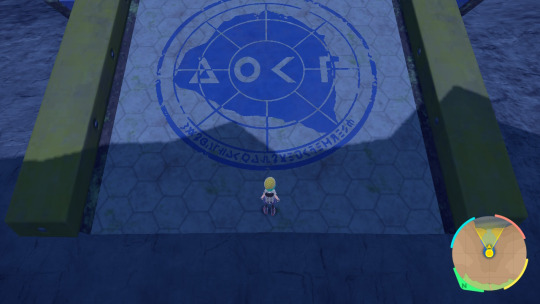
Now, where else have we seen other similar symbology linked to exploration?
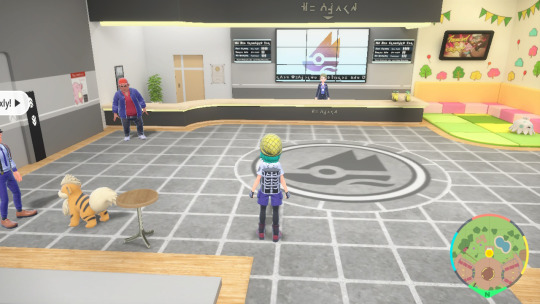
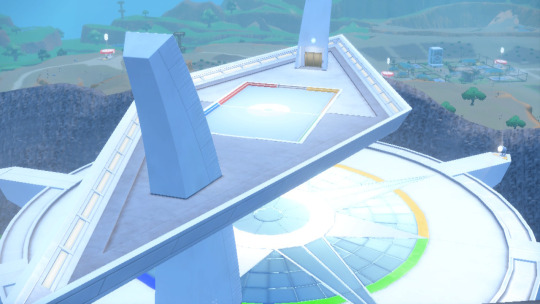
The Paldea Pokémon league displays quite a bit of this symbolism, with the boat logos of the gyms potentially representing the journey, and the vessel that drives one forward through it. Each gym is a pace forward on the path of discovery.
However, it’s the compass I really want to focus on, considering that we see it throughout the entire game. From the loading screen icon, to the gloves and lapels of every League staff member, the symbols seen across the League building, to even the rooftop of the very building itself!
The meaning of a compass is simple enough, it shows the viewer where the cardinal directions are, and is used as a reference point for navigation. In relation to the gym challenges, this makes a lot of sense. If the gym is the boat on a journey, then the League is the direction one should go in. It’s a point to work towards.
But what if that wasn’t the only thing the League was pointing you in the direction of throughout the game?
You see, I initially thought that the League and Champion Geeta were quite boring and more of a backdrop for Nemona’s fun little antics until I started to notice things in the background. Quite literally.
When you fight Champion Geeta, throughout the entire fight, you can see the Crater looming behind her. The roof of the League building even has a gorgeous compass incorporated into it, sure, but did you know that the ENTIRE building is actually in the shape of a compass too?
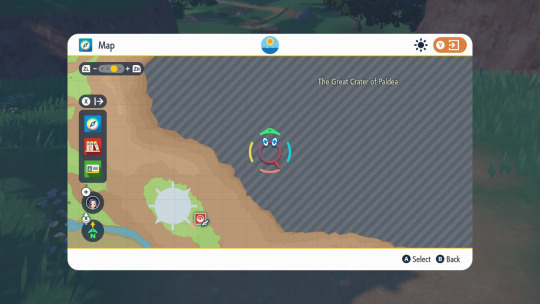
But rather than pointing in the direction of true north like the rotom on your map does, what is that compass and the building pointing in the direction of?
The Crater.
This isn’t simply an error either. With the specific placement of the league building beside the crater, and the way it’s framed during Geeta’s fight, the League has a little too much association with the Crater symbolically by this point.
We even know that the building is oriented correctly, because the Compass on Geeta’s glove lines up with the shape of the building perfectly.
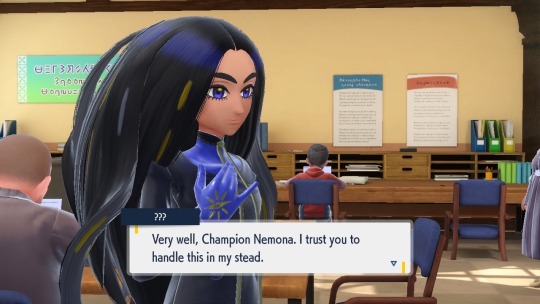
Speaking of Geeta herself, she also happens to have a rather damning reference to the Crater baked into her design. Her signature Pokémon, Glimmora, the Pokémon whose design shares visual flare with her outfit, is a Pokémon who is found exclusively within Area Zero and Terra Raids. It is also the only ‘regular’ Pokémon to have a dex entry that explicitly links it to the Tera concept.
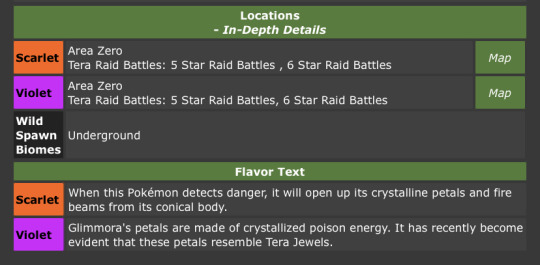
She’s even the one who gives your character the rare TM and recipe for the move Tera Blast, a move that is best utilised by Pokemon that have undergone Terastalisation in battle.
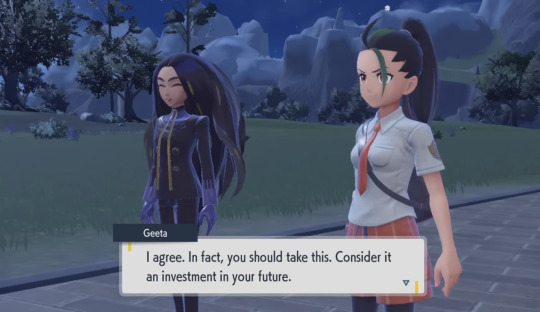

All this symbolism to do with travel conveniently lining up with the Crater, Geeta’s signature Pokémon being a Glimmora instead of the pseudo legendary of the region, what’s it mean? Surely these are too weak a link, you say. Well, I wouldn’t be presenting it if it was my only proof!
Do you remember how you’re given your Tera orb when going through the game?
Nemona states that these orbs are difficult to obtain and receive permission to use, and she very politely gets permission from Champion Geeta for you to use one. So the Tera orbs are a limited resource. It also just so happens that the League and the Academy were given these orbs by Turo, as told to the player by Miss Raifort in one of her history lessons. Seems awfully convenient, doesn’t it?
It’s because of these details that I think we have a good reason to believe that the League is profiting off of the Tera technology developed by Turo. I believe that they even helped to fund it, for a time.
Geeta’s polite and professional Champion Of Champion’s personality also happens to be accented by a desire to set an example for others (such as Nemona) and to create a spectacle with the battles that take place throughout the gyms and the league challenge. She also has a habit of being very interested in taking time out of her busy days as Chairwoman just to scout talent to recruit it into the league. Everything she does is to further the League, even recruiting Penny for tech support for the League in postgame.
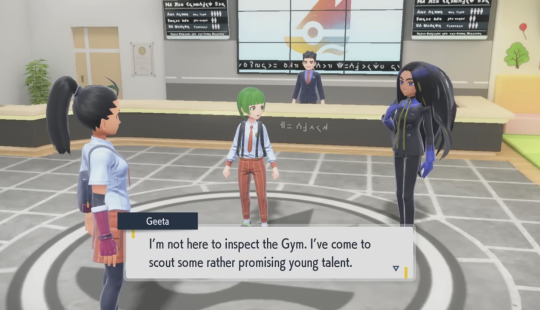
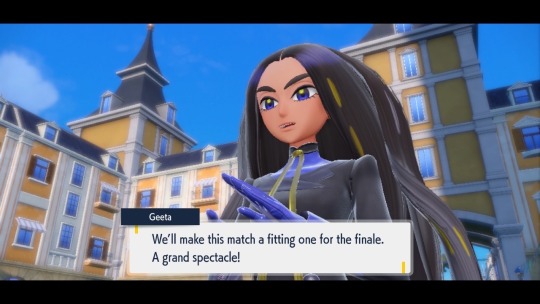
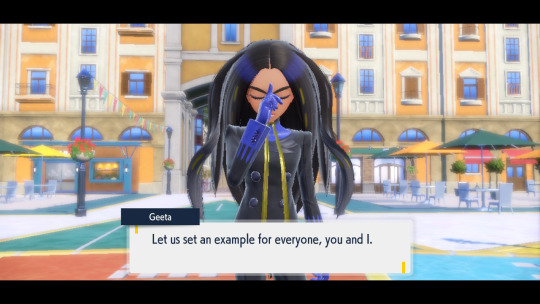
So it stands to show that she and the League would have a fair bit to gain from investing in the Tera technology, especially considering that she is currently stated to be the active Chairwoman of the League.
And now here’s the part where I get to say that I think support was discontinued for Turo some time ago.
You see, I think that in his obsessive downward spiral after Sada left, Turo became paranoid that others would discontinue their support of his project. And honestly, I also think that they did.
Turo was stated to have been missing from public view for a while, even before the window of time we can assume his death occurred in, and the league probably had what they needed from the Tera Orbs, so they might have left Turo to research whatever he wanted. After all, the League never really talks about Turo, despite him being the most famous scientist in the region and the reason anyone’s Pokémon can use the Tera phenomenon in battle to begin with.
However, there’s another possibility. And that may be the possibility that the League doesn’t speak about Turo not because they were simply done with things, but instead for… other reasons.
You see something that bothered me quite a bit during the story was this interesting technicality about the AI Defence System and the Pokéball Lock Technology that Turo created.
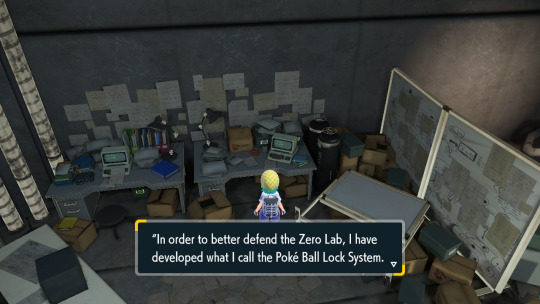
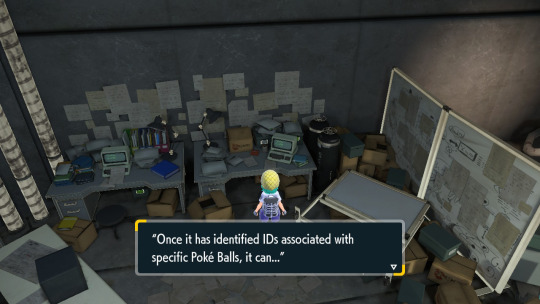
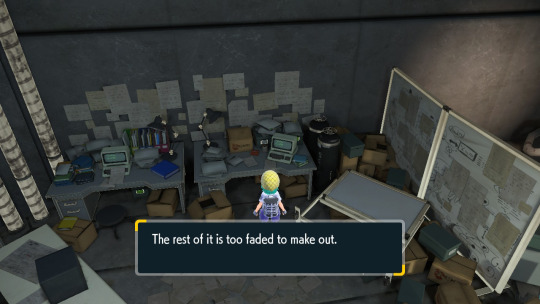
Why would Turo need this?
Think about it for a moment. If the Paradox Pokémon were the real danger, the very thing that ended up taking Turo’s life in the end, why was the security system built entirely around the concept of trainers other than himself?
Turo built this futuristic AI and the defence system it is connected to, and the Pokéball lock system. He built all of it to keep the Time Machine, his one shot at a perfect world, safe.
But why did he assume that he needed to keep it safe? We know already that the heavy iron gates and League rules bar most normal people from entering the Crater, and if that doesn’t deter them, there’s even biometric scanners that inspect any visitor who steps inside The Zero Gate. We also know thanks to a piece of dialog from Hassel that only a very small percentage of gym trainers even make it to over halfway through gyms in the region.
So then who was Turo afraid of? Easy!
The League.
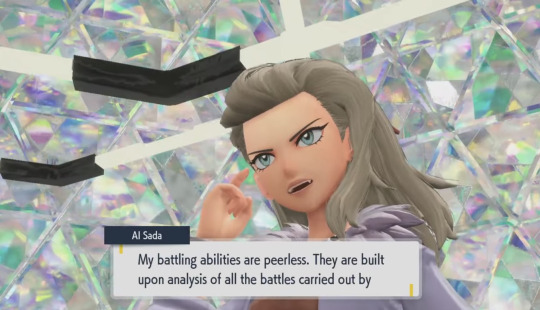

If the league were these mysterious investors, all of this would make sense. If they had visited previously, they could get past the gate or the biometric scanners. They could use force to stop Turo if they felt he was finally going too far. It would have given Turo enough of a reason to be afraid they would come bashing down the doors with Tera Pokemon, maybe even with his ex wife who might be able to figure out how to put a stop to his research.
No wonder why his answer was to build a battle system that could defeat champions and, if all else failed, could take the opposition’s Pokemon away entirely. Ironically, this paranoia for a defence system had Turo so afraid of other trainers, that he stopped being cautious around the paradox Pokemon, and ultimately lost his life because of it.
Without bleeding over too much into my post that I’m making about the psychology of the Professor, and without making this post too long, I think I’ll wrap-up by saying this.
We know that the Professor’s experiments were starting to get dangerous, so dangerous that they were beginning to make even corporate backers fret and even eventually driving away Arven’s other parent.
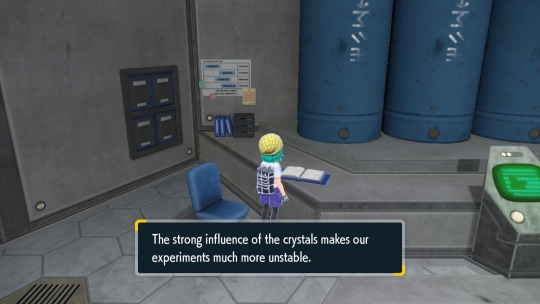
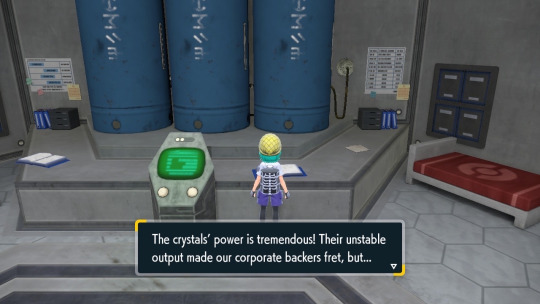
The Professor was an impulsive, obsessive individual, to the point where they did not care for the ecology of the Paldea region, they only cared about the means to an end. Keeping the time machine running. Even after corporate backers jumped ship due to the risk, the Professor continued. If the Pokémon League found out, they would surely intervene, and the Professor knew that.
So they made the Garden Defence System not for the safety of anyone who worked there, or for the protection of the local ecology, but to protect the Time Machine itself. And in order to protect the Time Machine from every possible threat that could face it, the Professor had to build a system that could even defeat the Champions.
So that’s where things stand.
Can’t wait to dive into why Turo is such an obsessive prick and how he expresses that in my next post, because there is a LOT of juicy hints around the game >:)
#pokemon#pokemon scarlet and violet#pokemon scarvi#pokemon scarvi spoilers#geeta#ai sada#turo#pokemon spoilers#analysis#arven#professor turo
245 notes
·
View notes
Note
Would be interested in your thoughts on how fandom has changed. I have some ideas (beyond the scope of the recent post about “content” versus community) but t it does feel related at the same time.
Some preliminary thoughts…
I think "this thing is The Best" and "this thing is The Worst" as 2 sides of the same coin, and fandom now feels caught between these 2 extremes, maybe skewing negative. Fans have always complained / disliked their fandom source material but there does seem to be a certain hostility that I don't remember previously. A strange contradiction of anti-fandom fandom, where ppl can strongly dislike something but still engage w/ it fannishly. I think of, say, peak MCU fandom of writing about all the Avengers living together in Stark Tower, or the flurry of fic that happened after The Winter Soldier, and how different that feels from fandom culture now. There’s a lack of sincerity or earnestness in fandom now, maybe.
Fandom has become more of an open community… where everybody sees everybody else's opinions all the time. Theoretically this openness should discourage echo chambers but I find ppl still get entrenched w/in their little groups and then fight & argue with others just as much. Compare tumblr to LJ, where LJ you could have a small group of friends and just talk/write fic within that group and never have to bother w/ seeing other opinions or get involved w/ fanwank. And that the norms for fandom discussion seem to be based around dunking & trash-talking vs. good faith conversations.
Very subjective, but fanfic feels more generic now. Less stylistic creativity than there used to be, and that a lot of fics are written in a certain voice / style that gets bland when you see it over & over again. Shipping also feels like the main way of fandom engagement much more than it used to be. Obvs shipping has always been a thing in fandom but I swear there used to be more genfic, casefic, character studies, etc.
Last thing: the breakdown of the 4th wall between fandom & creators. That kind of audience awareness can, IMO, go on to warp both fandom and the source material, in that fandom can believe they get to tell creators to write they story they want to see, while creators can be reactionary, in the literal sense, with their storytelling, writing a story based on fandom attitudes instead of just... telling the story they want to (either positively, in trying to write to what they think fandom ‘wants,’ or negatively, in going against what the fandom ‘wants’).
#fandom#i do think there's something here around broader changes in internet culture & 'netiquette' to use the old-school term#say how twitter was a medium built for cool dunks on bad opinions and not for genuine discussion
32 notes
·
View notes
Text
Anthropology Legacy Challenge
An Anthropology Legacy Challenge
By: Just.Simlish.Things
This mini legacy challenge is based on the study of Anthropology. According to Merriam-Webster, Anthropology is (1) the science of human beings especially : the study of human beings and their ancestors through time and space and in relation to physical character, environmental and social relations, and culture. (2) theology dealing with the origin, nature, and destiny of human beings.
As someone who is interested in human behavior and pursued a degree in Psychology, but dropped out cause college is hard… Anywho, I created this challenge originally for myself because I wanted to test myself as a storyteller. I wanted to see what I would choose and how I would write it based on my own belief systems and environment (a little about me, I’m a Christian, and I try to write my stories based around teachings of Jesus without it coming off as ‘preachy’ cause even I don’t like that). This challenge is meant to see how people from different walks of life, culture, beliefs, etc. would react when faced with two options. Well, your sims, actually. There’s going to be minimal rules because I want you to have full reign of the writing process. I’ll provide the prompt and you take it from there. An optional component: make a post at the end of each generation, explaining why you chose what you chose. I would also love to see what yall do with this challenge so if you end up doing it, tag me @just.simlish.things on Instagram. If you would also like to see this challenge, message me about it because I’m only doing it for my close friends, so I’ll add you if you want to see it.
Generation 1: Love or Obligation?
Prompt: Create a scenario that involves these two opposing themes. An example of this could be where person A is constantly working because they need the money but they love person B a lot, but their relationship is rocky because of the job. Person A then has to choose between their job (obligation) or person B (the person they love).
If you choose love: The heir has a happy childhood up until highschool.
If you choose obligation: The heir has an unhappy childhood up until highschool.
Generation 2: Fame or Lawlessness?
Prompt: Based on your choice from the previous generation, decide which path they will pursue in highschool. If you choose fame: The heir has a good reputation, until they’re caught in a scandal. If you choose lawlessness: The heir is a high profile criminal until they’re finally caught. Based on any trait that your sim has, choose one, decide how they will handle their downfall. Will they come out on top or accept defeat? Whichever you choose, will be the reputation that the next generation will start with.
Generation 3: In their shadow
Prompt: The start of this generation requires the heir to be in hiding until young adulthood. Someone from their parents' past notices them and starts treating them like their parents. Do you choose to be defined by your parents choices, or make a name for yourself?
Generation 4: Solitude or Community?
Prompt: You contemplate your family origins and you decide whether to let the bloodline end with you, or do you start a family knowing that this cycle could continue again.
I want you to have fun with this challenge. Explore different ideas and use your own thoughts, opinions, upbringing and whatnot to really flesh out each generation. I can't wait to see what story you tell.
#legacy#simblr#sims 4#sims 4 gameplay#sims 4 legacy#sims 4 machinima#my sims#sims 4 screenshots#the sims#the sims 4#ts4 legacy#ts4#ts4 gameplay#ts4 simblr
32 notes
·
View notes
Note
so uh Vorkosigan, would you recommend it, and if so where do I start, I hear there are reading order issues?
I’m a big fan and I think it would appeal to people who like ‘doing your absolute best to improve and thrive within the unfair constraints you’re given’ as a theme and political milieu. The internal structural storytelling work is particularly fine & makes them very satisfying; structurally they remind me of Diane Diane’s work and that is high praise, she really knows how to build ‘em.
Beyond the obv comparison of Mat Cauthon in his accidentally recruiting the Band of the Red Hand era, it reminds me of a couple series that you might be familiar with or at least have heard of?
Megan Whalen Turner’s King’s Thief series because Miles is essentially a noble rogue fighter & there’s a big focus on culture and politics including the politics of disability, and also because of the enemies to lovers arc.
Arkady Martinez’s Teixcalaanli series in terms of like… coping with an empire you love that doesn’t love you back, and other issues of identity.
Period romances like Pride and Prejudice, and some Georgette Heyer novels (she’s famous for excellent regency romance).
There are a lot of genres including coming of age, adventure, period piece & romance mixed in with the SF, which means you can kind of jump around to suit your mood. It’s a bit like Discworld in that there are multiple potential starting places, but also clear internal arcs that work best if read in chronological order.
I used this guide: https://bookriot.com/vorkosigan-saga-reading-order/ which is mostly chronological with a few exceptions for maximum emotional impact. The guide also explains the omnibus editions (which is part of why it can be confusing to figure out the reading order). Just don’t read in publication order, it makes no sense that way.
I recommend starting with Shards of Honor and then Barrayar if you want to start at the beginning, you want a female POV character, and you are in the mood for some great enemies to lovers romance. (This is the story of Miles’s parents.)
If you’re more in the mood for ‘coming of age adventure where a young man with many problems accidentally recruits a mercenary army’, you can start with The Warrior’s Apprentice and then The Vor Game. (The series is mostly about Miles so this is the ‘straight to the main character please’ version.)
There are some content warnings for sexual assault in Shards of Honor (I’d put it at around the Robert Jordan balance of explicit description vs implication) and sooooo many content warnings for Mirror Dance (physical and psychological torture including sexual assault & exacerbation of a character’s binging and purging eating disorder- it’s handled well but it is more explicit & goes farther than what happens in Shards of Honor.) Komarr has domestic abuse (emotional). Lots of heavy stuff but it is dealt with in a thoughtful and nuanced way, and characters have chances to heal afterwards.
Your library probably has them in physical and ebook form, and you can also find them for around 6-8 per novel as ebooks (the omnibus editions are a better deal as ebooks). A used bookstore with an SF section probably has one or two as well, they’ve been around for 35 years.
77 notes
·
View notes
Text
Quick & Sloppy Analysis of Blue Eye Samurai
Mizu is from a time period before western ideas of gender took hold in Japan. A lot of the discourse around Mizu's gender seems to stem from what people think transgender identity is in a 21st century, western context.
They were born as a woman but had to live as a man. The rub over whether or not this makes them trans seems to come from these two points.
Many people transition because they have always known they were another gender born into a body that does not reflect that gender. If they were forced to live as another gender, that doesn't count as trans.
Many people are transgender because their sex and gender are different. Mizu was physically born in the body of a woman, but functions in society as a man. Regardless of how they came to be, they are, by gender, a man.
Mizu themself did find happiness as a woman, but had it snatched away from her by a man's insecurity over being bested by his wife. Mizu found comfort living as a boy under their Swordfather's care, but felt shame for hiding his true sex from him.
I think these two periods of their life are not about which slot in society they fit in, because obviously they don't fit perfectly in either, but acceptance by the people they choose to love instead. Mizu was forced by filial duty and love for their mother to become a wife, but fell in love with Mikio when he began to accept her as she was -- until he didn't. Master Eiji accepted Mizu as a boy, and raised him as he is. He stopped Mizu from confessing his sex not because he couldn't accept it, but because it didn't matter. The most telling scene to me is when Mizu says that they must be a demon, and Master Eiji tells him, Yes, perhaps they are, but that is only one part of a whole.
The show is social commentary on our expectations for people of certain classes, genders, and racial makeup. One of the biggest themes of this show is about the limits of living as a woman during the Edo Period, and the creators refer to them as "she," as she is based off of their daughter.
But we are free to interpret Mizu's gender as we wish. The whole point of their existence is that there is a question of culture and identity in our modern, globalized age, and instead of a yes or no answer, we are given a whole person and the story of their life in a completely different culture and era to draw our own conclusions.
The debate over Mizu also reminds me a lot of how westerners will point to certain historical figures throughout history as examples of genderqueer identity having always been a thing. Chevalier d'Éon of France and Bíawacheeitchish (Woman Chief) of the Crow Nation come to mind. How they identified may not fit the 21st Century English-language phrases we apply to them, but the idea is still that they lived outside of the social expectations of people born in their bodies.
Sidebar:
Mizu's reveal as someone born into the body of a woman surprised me, actually! As someone who grew up on East Asian media (primarily C-drama and anime and K-pop, with full cultural context for the former but only what I learn from my friends for the latter two), I'm very used to androgynous characters! My whole thought process throughout the first few episodes was, "Wow, they really took C-drama tropes and put them in an American show!"
Even after the reveal, I was like, "Oh, they took the other trope!" where in C-dramas, male characters played by female actresses turn out to be female characters disguised as men in order to roam with more freedom.
This whole show felt like I was watching a C-drama turned into a western cartoon, and because one of the creators is Japanese American, it made me realize how many tropes must've carried over from our Chinese and Japanese storytelling, and our cultures' influence on each other.
#this post brought to you by a second gen chinam#tears falling like peridots#bes#blue eye samurai#netflix blue eye samurai#netflix series#mizu blue eye samurai#mizu
43 notes
·
View notes
Note
https://www.tumblr.com/bestworstcase/740971489166311424/httpswwwtumblrcombestworstcase74032567622112
it's the resistance to imagining any ending that does not simply replicate a system that is catastrophically failing right before our eyes and also would not have any reason to exist
I can't speak for everyone, but I think there's a strong aversion to discomfort present in this kind of mentality. There's a lot of lipservice to the notion of change and evolution and revolution, but a lot of fandom and people in general are VERY averse to anything, even storytelling, that doesn't ultimately result in something that they feel is comforting to their points of view or desires.
It's why people keep throwing fits about certain characters not doing things a certain way or according to certain archetypes. It's why certain plot points make people froth in the mouth or outright get it completely wrong.
They don't really seem to care all that much about story as a narrative or as a means to convey complex themes and messages that might be genuinely thought-provoking and uncomfortable, so much as they view stories as an extension of their own comfort zone, even at the expense of the story itself.
i mean. maybe. online culture is very inclined to treat discomfort as a Bad Thing that should be shunned (& in extremes, something people should be protected from feeling at any cost, which is part of what drives the pearl-clutching hays code 2! types).
but i think it's a lot more that:
fandom, being oriented around transformative engagement, is invested in the text primarily as a sandbox; the pervasive cultural attitude toward the text is that things you don't like can be discarded and the rest raided for spare parts. any space whose ethos is "fuck canon!" is going to disincentivize serious analysis of the text in favor of the creation of fanon—which is always homogenized and reduced to tropes because it's an accumulation of popular ideas, i.e. the organic crowdsourced cousin of corporate sanitization for mass appeal.
many fans do not differentiate clearly between canon and fanon to the point that there exists confusion between analysis (interpretation of the text) and headcanon (things held to be true irrespective of the text), which are in fact diametrically opposed and don't meaningfully overlap; consequently fanon is widely conflated with canon in addition to being prioritized.
fanon is shaped by cultural biases within the fandom which generally means "riddled with prejudice and stereotypes" and in rwby's case in particular means "sexist"—the story BEGINS with a fairly overt condemnation of the huntsmen system ("so you may prepare your guardians, build your monuments to a so-called 'free' world, but take heed: there will be no victory in strength"), and at the end of the first act a character gives a speech laying out it in even clearer terms. i do not think it's coincidental that the fandom that twists itself into pretzels to interpret salem and cinder in the harshest possible light is also the fandom that absolutely refuses to consider the possibility that these two characters Have A Point about the huntsmen system, actually.
most stories do not radically alter the narrative status quo. (this is true even of revolutionary narratives—the unjust system present at the beginning of the story will be overturned, yes, but more often than not the characters recognize the injustice from the beginning and at most learn that it's worse than they thought.) most stories do not slowly and inexorably build up to "the heroes are good, but the villain is right, and everyone needs to pull together to fix what is broken" as the climactic resolution. i cannot emphasize enough how unusual rwby is in what it's doing with salem, and the build up has been gradual enough—stretched over literally a decade!—that for longtime fans in particular, it's easy to overlook. fanon fills in the gaps with tropes, the complete monster who cannot comprehend good, the tarnished mentor nevertheless trying his best to do the right thing, the plucky heroes who fulfill his ideals in earnest, and later developments are interpreted through the lens of fanon.
to an extent it's a feature, not a bug: tropes over text is just what fandom is. it's just a lot more noticeable with rwby because a) rwby is an unusual story that does not lend itself easily to fanonification, and b) "the huntsmen system is broken and will fail" is an idea introduced into the narrative by two female villains who have been wronged by that system and the man who built it, so naturally the fandom dismisses it out of hand.
22 notes
·
View notes
Text
Some Punk Genre Ideas
Writing that horribly long Punkpunk genre overview, that obviously missed some of the punkpunk genre, I could not help but think that there are some punk genres that are somewhat missing or could be defined. That is genres, that kinda use the punk idea and mix them with certain scenarios or retrofuturism. And I would argue, that these genre already somewhat exist in one way or another, but have not quite been defined.
Once again, I will go with this idea for punk ideology – and with the presumption that this somehow should play into the genre.
[Punk ideology] is primarily concerned with concepts such as mutual aid, against selling out, hierarchy, white supremacy, authoritarianism, anti-consumerism, anti-corporatism, anti-war, imperialism, conservatism, anti-globalization, gentrification, anti-racism, anti-sexism, class and classism, gender equality, racial equality, eugenics, animal rights, free-thought and non-conformity
Please note: While I absolutely think that there is a ton of stuff that could be explored in regards of retrofuturist ideas based around non-white cultures and technologies (for example by defining more punk derivatives from Amazofuturism and Afrofuturism), that is nothing for my white ass to talk about. 😉
I will start with three anime derivates – that have most certainly inspired this kinda storytelling before…

Mahoupunk
As a genre: The magical girl genre is ripe for deconstruction, and sees more and more of the sort even in western media. While traditionally the genre often concerns young girls and their magical powers in a story of self-discovery and coming of age, it also usually has a lot of potential in terms of both who the magical girls fight and who they get their powers from. I propose that Mahoupunk could feature both stories of magical girl powers being used by those in power for oppression with others – both Magical Girl and normies – trying to fight this system, or of Magical Girls awakening in a dystopic world (possible Cyberpunk), trying to change it for the better. The wide variety of the way magical girl powers can be used would allow for a variety of storytelling opportunities, given the powers can be used both in terms of combat, but also in terms of mutual aid.
As an aesthetic: The aesthetic could play around with classical magical girl elements against a rather dark and gloomy backdrop. We see this already a lot in magical girl deconstructions, with the pastel colored magical girls with their hearts, ribbons and flowers against a dark skyline.
Punk-Factor: As I propose it, the genre would play around a lot with the question of “Who has power and who uses it for what?” The magical girl powers – or those, who distribute it – can be a tool of the powerful and the oppressors, but they can also be a tool for those who fight against this kinda oppression. And this fight against oppression and the trial of helping others are most certainly punk elements.
Examples: My Otome, She-Ra and the Princesses of Power
Note: The idea here kinda comes from my frustration over the lack of magical girl deconstructions. We have dark magical girls, yes, but most of them tend to be “magical girls but dark and gritty and people die”, rather then exploring the themes about magic and who gives it. Yes, Madoka and Uta~Kata kinda explore this a bit, but it never goes further into the who gets and who controls magic – the way that some of the following genre explore those themes.

Mechpunk
As a genre: Admittedly, this almost feels like cheating because the Mecha-Genre has been deconstructed about five hundred times already and kinda already does this on the regularly, which always makes me surprised that so few people dare to put it on Cyberpunk lists for example. What I propose as Mechpunk could also be called Gundpunk, because, let’s face it, Gundam has my ass pretty much covered. In a world where SuperRobo-style Mechas are the most effective type of war machinery, they will get used to oppress people and uphold the (often capitalist) status quo, while not rarely people from the lower classes might find themselves forced to pilot these suits. But being the effective war machines, they also can be used to break the cycle. As such the pilots might need to navigate their way between political strive and the fight for a better world.
As an aesthetic: Again, this genre feels like cheating, because at least a forth of all the Mecha anime out there play it like this – but it also has found its way into western media like this. I feel, we should embrace the aesthetic of the SuperRobo and those neat overstyled pilot suits, though. Put that in front of a rather dystopic cyberpunk backdrop and it plays a lot with the contrasts.
Punk-Factor: Again, fighting the system of oppression definitely qualifies as punk. I would also be super interested in seeing stories, where the Mechas are used in more creative and productive ways, such as mutual aid.
Examples: Basically two thirds of all the Gundam series out there, Bokurano, Iron Widow

Monpunk
As a genre: While the other two are examples of genre, that have been played around with a lot, I also have to talk about my kinda favorite anime subgenre, that has been explored too little so far: Monster taming. While not the first of its kind, Pokémon is probably the most influential part of the monster taming genre, but there are a ton of others out there. While it is obvious that this genre is heavily inspired by Shinto believes, I find it almost sad, that there are rarely any deconstructions – but Monpunk would be one of those. Monpunk would explore both the spiritual and the ecological aspects of the monsters. The creatures, that are inherently linked to their human partners, are exploited – be it by the system or their human partners themselves. Pokémon itself allows itself for such readings, and I would go as far that at least Takeshi Shudo’s novels can be read in a way that the Pokémon and trainers are exploited by a capitalist system. The genre could explore the bonds between humans and creatures, both as friends, but also as an exploitative relationship. It could also feature characters getting aware of the exploitation happening.
As an aesthetic: Something that to me really works well about the entire monster taming genre is the contrast between humans and creatures, so this is something that could be used in the design aesthetic. Slick human designs with kinda futuristic outfits meet wild creatures, that are monstrous and feature natural elements.
Punk-Factor: As so nicely pointed out by that Wikipedia description of “punk ideology”, there is also an aspect of animal rights and environmentalism to punk, which could be explored within this genre. And of course, going the Pokémon route, this could also be super interesting as a comment on capitalist systems.
Examples: The Pokémon novels by Takeshi Shudo, Kaiba, MyHiME
Note: While the capitalist reading might also work with “merch bound mons” (like the cards in Yu-Gi-Oh and its derivates, or the Beyblades), I do not think that this kinda story would quite work with what I imagine here.

Did I choose the genre based on starting with the letter M? No, I did not. It just happened to turn out that way. But I kinda find it fitting.
There is the general thing of course that a lot of western media still kinda struggles with these ideas in general. We do not get a lot of books or movies based around these genre in western media, even though I know there are quite a lot of writers who write about it. I think this is partly, because it is seen as “childish”, but partly also because people do not quite get what it could look like outside of the visual medium, which at least the mechas and mons heavily rely on in their storytelling.
Still, I would absolutely love to see these kinda stories told in all sorts of media. And god darn it, book publishers. Give those magical girl stories a chance.
Moving away from anime/manga inspired ones and going back to some more history inspired ones:

Knightpunk
Note: I know I am not the first one to propose something along these lines. I have seen the title Castlepunk and Plaguepunk thrown around quite a bit. But there is an argument to be made for a world developing technology from the medieval feudal setting onwards, with stories being told within all sorts of time periods.
As a genre: The defining feature of Knightpunk would be that it is set within an anachronistic feudal setting. There are kings and queens and nobility who hold power. The world has duchies and landlords (who actually hold land and not just houses). And most of the population are considered uneducated peasants used for menial work. While technology has improved, there are still some of the problems going around like the danger of famines. The church, too, has some hold over the people, threatening them with eternal damnation. And the knights exist to uphold the status quo. The central conflict of these stories would feature characters trying to either find a way they can exist in peace – or actually overthrow the system. There also could be stories told about the value of education, medicine and moving forward as a society.
As an aesthetic: I would argue that as an aesthetic Knightpunk already exists. There are a ton of stuff that play around with medieval fashion and of course armor and adding modern day or even futuristic elements to it.
Punk-Factor: Playing it as I imagine, the stories would be quite punk both in terms of featuring counter culture, and in terms of tackling themes of standing up against a corrupt system.
Examples: Nimona, Jupiter Ascending, Code Geass

Druidpunk
As a genre: I am surprised this is not a thing yet – but maybe I should not be that surprised after all. Druidpunk takes inspiration from the time between about 200 BC and 500 AD, with both the Roman colonization of Western Europe and the later Christianization of the area, which also included Pegan hunts. This might also be used as an inspiration for more futuristic settings build on those ideas. But the central conflicts arises from the violence that Roman and later Christian forces inflict on the Celtic population of these areas – and it would feature conflicts both of faith and of power within it, seeing that this Celtic population would often be seen as second class. It would also play around with Celtic ideas of fae and magic in a way of fighting the oppressors, as well as with ideas about the value of preserving knowledge through stories.
As an aesthetic: There is a respectful way to go about this aesthetic and one that is less so, and in this case I think both are kinda alright? You can go with playing with the aesthetics of real Celtic people of the time, maybe given them some visual updates and just lean more into stuff like the Celtic knot and what not. Buuuuuut, you also could just take your average Dungeons & Dragons Druid aesthetic and dial it up to 11. Bonus points if you use this against a more downplayed Roman aesthetic.
Punk-Factor: Admittedly, despite it featuring kinda a fight against colonization, I would argue this is a bit less punk and more about the general idea (and my frustration with how little we see written about this time from this perspective).
Examples: I don’t know if there are any books like this. You tell me.

Guillotinepunk
Note: How is this not yet a thing? I really tried looking for something along the lines of this idea, but… it does not seem to be a thing so far?
As a genre: The history of the French Revolution is a complicated one. Other than what you have been told, it did not quite fail, rather it petered out and then there came Napoleon, took part of the ideas and threw away others. But what if we use the ideas of the French revolution and tweak the setting a bit. Maybe this is retrofuturist and the Revolution just continued. Maybe the revolution happens within a more modern setting – but similarly as it did in reality. But there is strive and class struggle here. The people are rising up against the nobles, who have suppressed them for so long. Heads are rolling and for a moment things seem great. But as the revolution continues, the disagreements between the revolutionaries will become more and more clear, with factions turning against each other and a battle of ideas starting.
As an aesthetic: There are guillotines and there is the fashion of the upper class of the epoche, but taken to an extreme, that we did not quite see in reality. This might be mixed with anachronistic elements, that come to play within the aesthetic. Maybe some military aesthetics mixed in there as well.
Punk-Factor: I would argue that the French revolution is pretty darn punk. You know, those punk ideologies from above? Most of it was aspired to by the revolutionaries. Though I would argue this genre would be just a bit more, as it would also consider the rifts between different parts of such a movement – and how they might or might not be mended.
Examples: Cake Eater (2022) – I still think there gotta be others, because it is so obvious. But I cannot think of any right now.

Tsarpunk
Note: Yes, I am aware that Leigh Bardugo already coined this term, that so far is mostly used to describe anything written by her. However… You might see this coming, but… Let’s add a bit more punk to it, shall we?
As a genre: Tsarpunk could play around with Russian society before the revolution happened. There is a tsar and there is the nobility who owns, at the point, also most of the factories that are becoming more common. A lot of the poor people are serfs under them. There are people, who are willing to rise up against the system – and some of the nobility find themselves drawn between the faction of the tsar and the potential revolutionaries. Steeped in Slavic mythology, there might also be magic and creatures, that court the line between fantasy and horror elements.
As an aesthetic: The aesthetic could mix up the entire Slavic influence a lot more. Aesthetically Slavic culture is very interesting, as it has a lot of intricate elements. There could also aesthetic influences be drawn from Clockpunk, as such mechanations are tied to Russian of the time a lot.
Punk-Factor: Again, Revolutions tend to be pretty darn punk, so playing up the revolutionary angle will give some punk points in my book – though if the revolution is less played up, it might also be less punk as a potential genre.
Examples: The books of Leigh Bardugo, but I would also argue that in a way The Witcher qualifies as well.

If you left me to it, I would probably be able to name some more ideas for historically inspired punk genre. After all, there is a ton of potential there, even if we just look at European history. Especially given the parts that we are looking at so far. (Note to self: I kinda wanna write something about how some of the punk genre could do more with the general idea and setting…) I do also think that kinda the issue with how some people are tackling the punk genre so far is too much of “fantasy/scifi, but with [insert historical setting]”. Instead of going: “What if Cyberpunk, but [insert settings]?” So, there is not as much as theming happening, as there could be. And I do not even necessarily mean those anti-hierarchical/anarchical punk themes. But also more general… themes. You know? THEMES!!!
Also there is a kinda genre, that would also make for an interesting exploration…

Vampunk
Note: Alright, I admit it, this is here because of my near constant vampire obsession, but I also think that vampires are a wonderful vehicle to tell punky stories, based on the simple fact that vampires inherently serve often both as the oppressor/exploiter and the marginalized.
Let me start with talking about the duality of vampires.Vampires inherently are dependent on somewhat exploit humans in most scenarios, given they need to drink human blood. As such vampires have always an incentive to somehow keep humans around and somewhat dependent on them. Often enough they are kinda equaled to nobility or in more modern settings with CEOs and boards of directors. At the same time vampires in most settings also need to keep themselves hidden, fearing some sort of anti-vampire inquisition, with this often being kinda a vague metaphor for queerness.
As a genre: Vampunk would feature a world that has some Cyberpunk features. But the world is secretly run by vampires, who work as the world’s CEO and board members, using their positions to get easy access to the blood they need to survive. However, within the vampire society there is also a large divide between the haves and the have-nots. While the upper-class vampires have power, control and all the blood they can want, the lower-class vampires often barely scrape by, their access to blood regulated through those above them. As such lower-class vampires need to figure out, whether their true allegiance should lie with the vampire upper-class or the humans so unwittingly exploited by them.
As an aesthetic: I think the best aesthetic for this would be something along the lines of Gothic Noir with maybe some punk elements within it. A gothic aesthetic is a no-brainer for this genre, though.
Punk-Factor: The genre could be very much played for punk factors, by playing these stories were much as a class struggle and around the realization that the lower class of any privilege group has as much in common with the marginalized than with the privileged upper class. It should be noted, though, that one has to be careful in this genre. The Victorian vampire had some roots in antisemitic myths and if not threat carefully constructing a genre like this might lead to unintended antisemitic readings.
Examples: Daybreakers (2009)

Fun fact, I find it weird how Daybreakers was universally loathed when it came out in 2009, but recently I actually see a lot more appreciation for that movie. And I think it shows those ideas pretty well. I would also argue that the latter Underworld movies had some of those themes. And I would also argue it is different from usual vampire fantasy on the basis of being more thematically dense. I am kinda hoping that Castlevania Nocturne goes into this direction.
Finally going to some outright futuristic ideas. Things that might kinda exist already as parts of the other punkgenre (mostly Cyberpunk), but are kinda worth exploring on their own. And yes, those again have anime examples, because…

Virtupunk
Note: This definitely is a kind of genre that already does exist but has not been explored in the punky way a lot so far. At least not intentionally.
As a genre: Virtupunk is set in a world that has some Cyberpunk features. Corporations rule a good part of the world, though it might even look like our everyday world. (Because we life under late stage capitalism.) Technology has advanced enough that virtual reality is a thing in one way or another. As such a lot of people interact with the world at least partly through the virtual reality. But even this reality is owned by corporate interest. The virtual world is a thing all on its own, though, in a way that even those corporations running it do often not quite understand. Within it AI is developing faster than anticipated – and only some people seem to understand the importance of it. The protagonist fight – at times with the AI and at times against it – to retake control of this new virtual reality. A central theme is, though, how the virtual world, that kinda functions as a metaphor for the internet, allows people to connect and organize.
As an aesthetic: While I will argue that this is definitely something that exist as a genre, there is not much of an aesthetic so far. Generally, of course, VR headsets will play into this, but not all versions of this genre interact with the virtual worlds through this. The virtual worlds themselves can often be somewhat strange and crazy, breaking with established rules of the real world.
Punk-Factor: I would argue that the central punk theme in this kinda story is even less about the “rising up” part, but rather about the connection and the means of organizing. Though there will usually be some aspects about “taking back the virtual world”.
Examples: I would argue that the main example here is Mamoru Hosoda’s kinda “internet trilogy”, with Belle being the strongest example here. .hack// does definitely also qualify. Also: Serial Experiments Lain.

Augmentpunk
Note: Now, this is a thing that appears in Cyberpunk a lot, but is barely ever thematically explored. Which I find kinda sad.
As a genre: Like Virtupunk, Augmentpunk borrows a lot from Cyberpunk, though its setting tends to be a lot more toned down. The technology taking over in this kind of stories is Augmented Reality, which might either be accessed over devices such as glasses, contacts or masks, or even be just somehow inherently accessible. The AR exists within the real world – mostly – as an additional layer. Depending on how anti-capitalist the stories wants to go, it might feature the constant barrage of advertisement the characters are put under. More often, though, this genre will explore how AR makes the lines between the real and the virtual blur, at times completely destroying concepts of reality.
As an aesthetic: Augmentpunk loves playing around with the idea of overlaying different layers to reality. You will find a lot of holographic images floating over the world and characters in this aesthetic, often contrasting colorwise with the designs of the characters otherwise. There tends to be in general a contrast between a more mundane world and a strange augmented reality.
Punk-Factor: Usually these stories to not go far into the punk themes. There might be a bit with anti-capitalism or something about our addiction to technology, but that usually is about it. It still is something I enjoy, though!
Examples: Dennou Coil, Accel World

Those are just some ideas that I have. I would also be super interested in seeing what other ideas you guys have. How could we interweave those punk attitudes with other genre/settings?
#cyberpunk#steampunk#solarpunk#genre deconstruction#deconstruction#anime#anime and manga#mahoupunk#monpunk#mechpunk#knightpunk#druidpunk#tsarpunk#guillotinepunk#vampires#vampunk#virtupunk#virtual reality#vr#augmentpunk#augmented reality#ar
104 notes
·
View notes
Note
do you think anakin likes to read out loud?
like ahsoka and anakin take refuge in a cave and camp out, and somehow anakin decides to tell/read her a story to go to sleep because it’s what his mom used to do for him. i bet he has a nice reading voice. do you think he tries to act the voices out a bit?
Hi sweetie bug! I thought about this ask for a really long time honestly, 1) because it was such a wonderfully out of the blue question, you always bring me unexpected things, 2) busy :(
But the answer is oh my fucking god absolutely, not only because of Shmi amd her wonderful reading voice and stories, but because anakin was a slave living amongst other slaves, I have to imagine the Oral tradition is very much alive and well, considering the limited amount of posessions they are permitted. That being said, I imagine slaves aren't allowed to congregate often, isolation is the killer of hope after all, but there may be a select few days a year. With little lot food to go around, slaves tend to eat slowly, savouring flavour and conversation to let their bodies get full, storytelling and gossip have to be a part of that I'm sure of it. Older slaves, ones who've lived a bit of life outside of slavery tell stories about their lives, other planets, fables from their home-cultures. Teenagers, tell stories about their little moments of rebelion to the younger slaves, things they've stolen from markets, sneaking out to the whore houses, plans to escape, Triune Xelarpo Did it, didn't you hear about that? Just last year, I swear! Rumour is, he forund a corellian Electro-magnetic sometjing-something and temporarily disengaged his tracker long enough to leave, all a slurry of half truths and exaggerations. And then there's little anakin, anakin with wide eyes and open ears and a tiny frame that makes the adults around him forget he's there sometimes. The traders, the smugglers, the deep space pilots, he loves being a fly on the wall in their coversations when they brows Watto's store. He listens while they talk about any- and everything, spice, women, life back home, deep space urban legends, he absorbs it all and takes great joy in standing in the middle of a bunch of slaves his age and being a little storyteller. Always spins the tale like experienced it himself, Shmi always tells him to be careful not to fill their heads with ideas that might get them introuble, ideas that make them think too much about the world beyond this planet and weigh their hearts down with dreams.
He doesn't get the same joy out of being the center of attention anymore, storytelling as a whole is probably a hard thing for him to do, it feels like the hobby of the desperate, those who need to escape themselves, it inspires a tiny moment of reprieve to the hopeless and he is not hopeless anymore, he is proud as ever (his words not mine, mind you). But if it's just him and Ahsoka, if the night is warm enough, if the fire is tended to and they are safe and dry, he'll tell her a tale and one without a lesson. It's no proverb, no fable, no parable, it's just a story.
40 notes
·
View notes